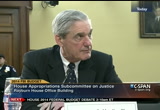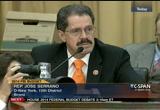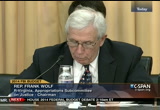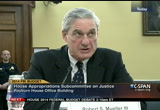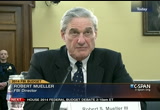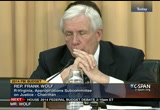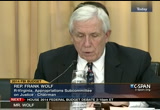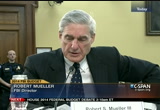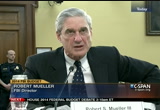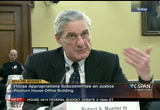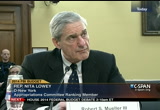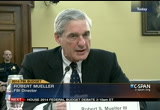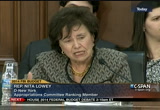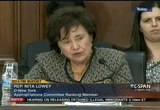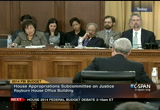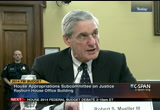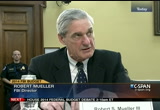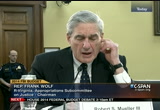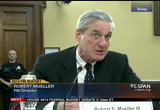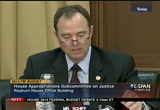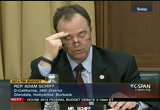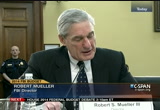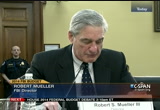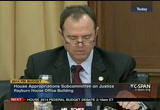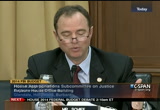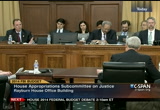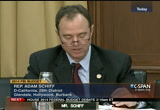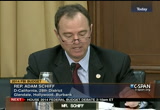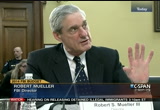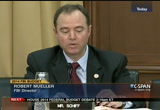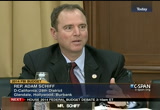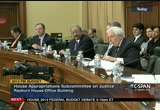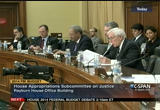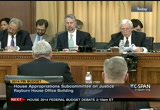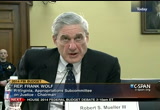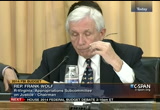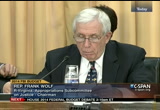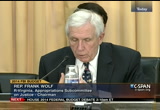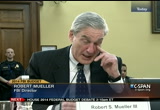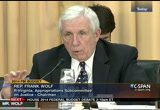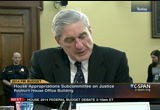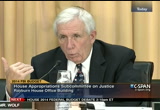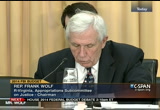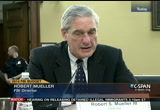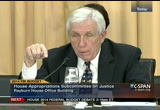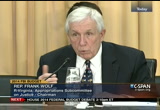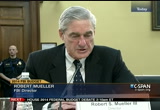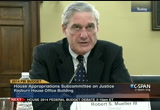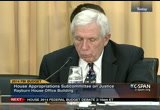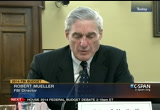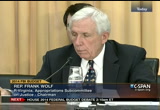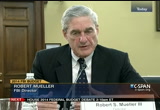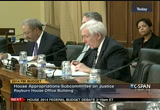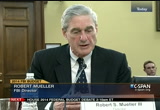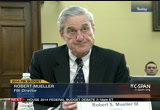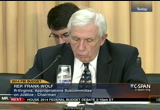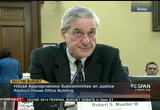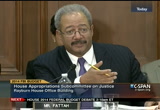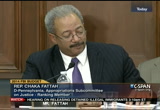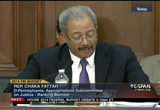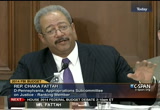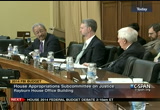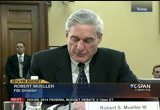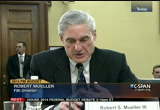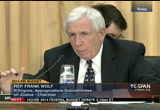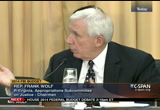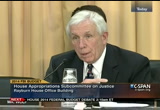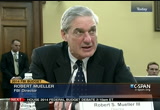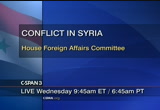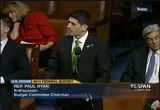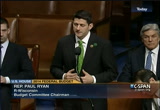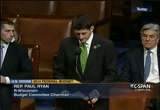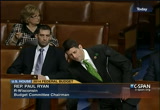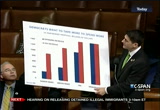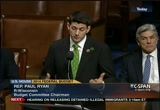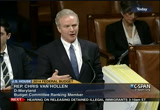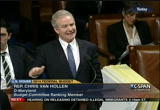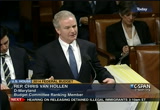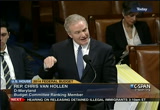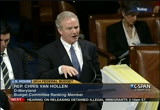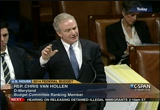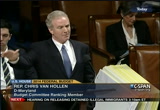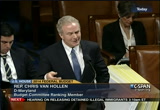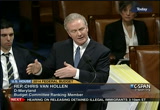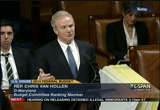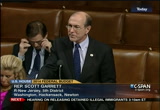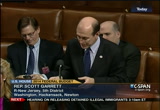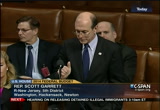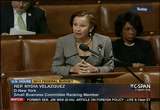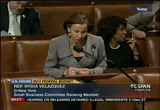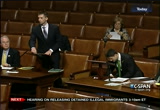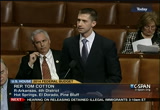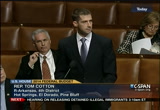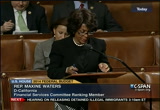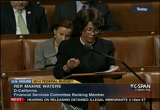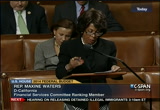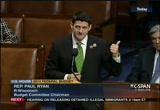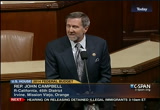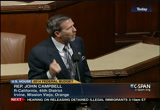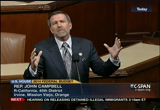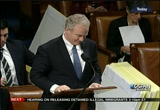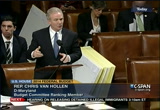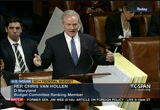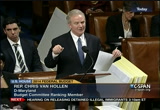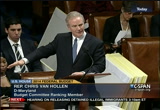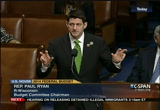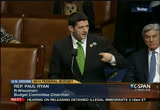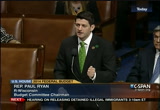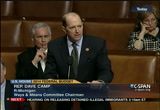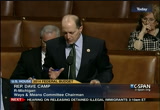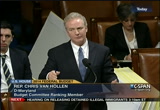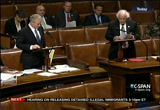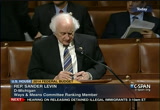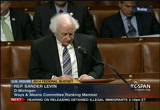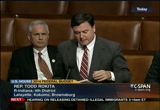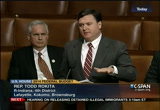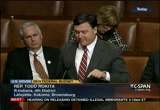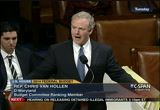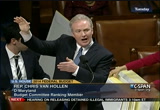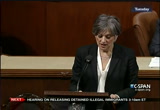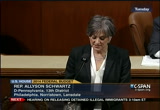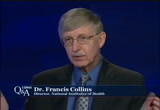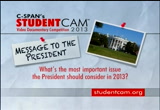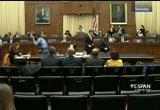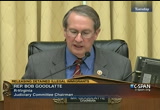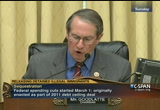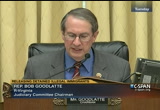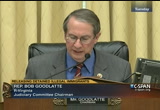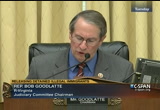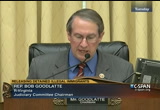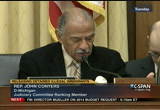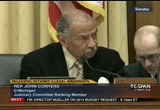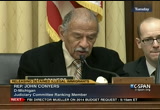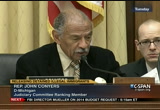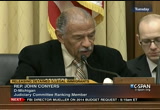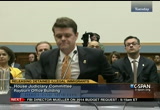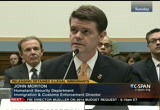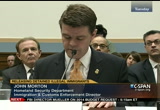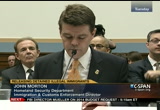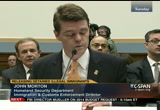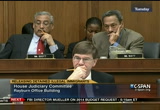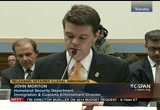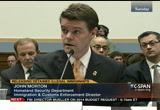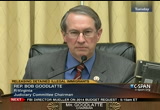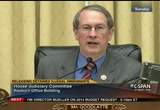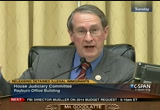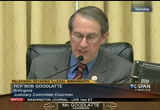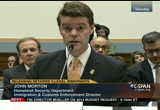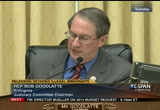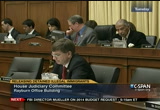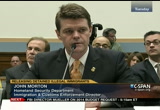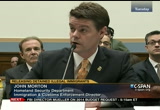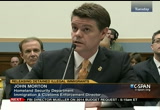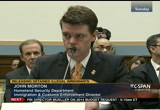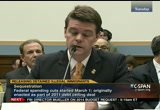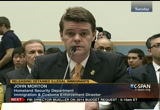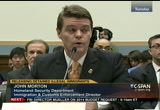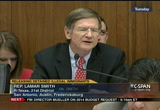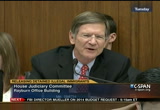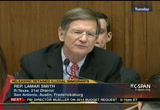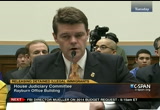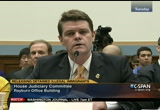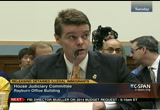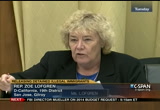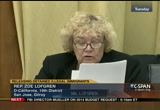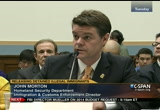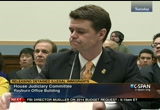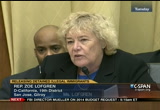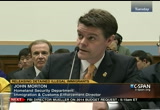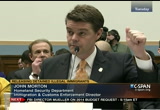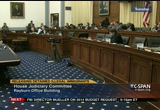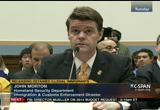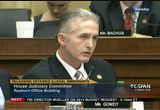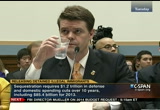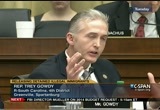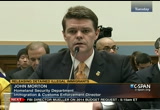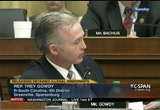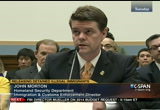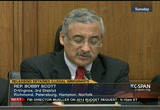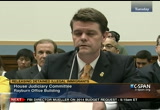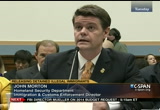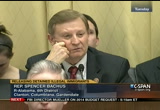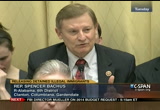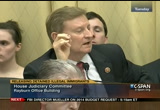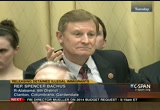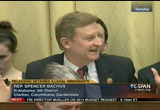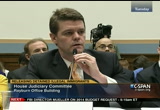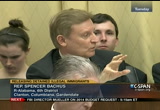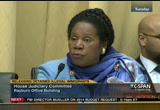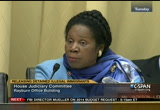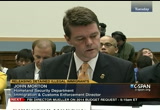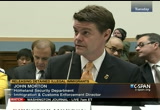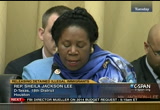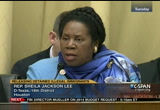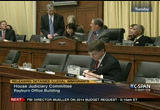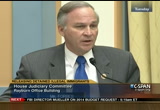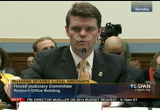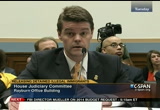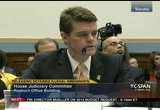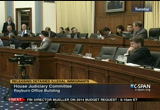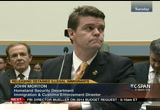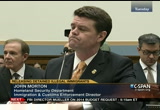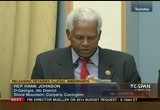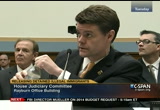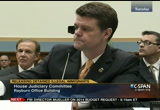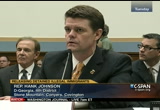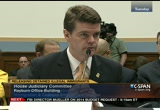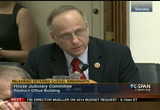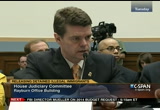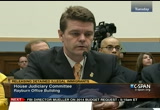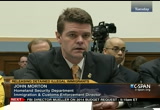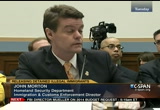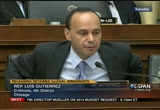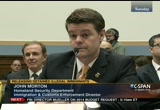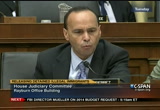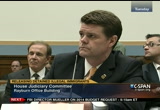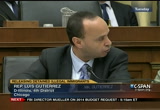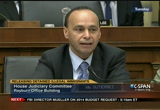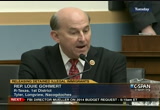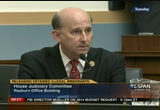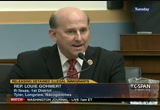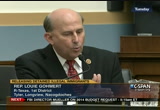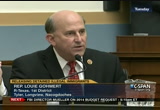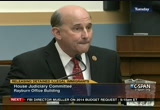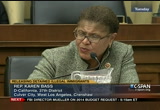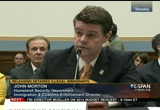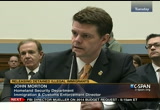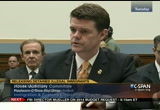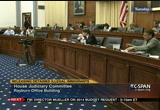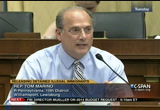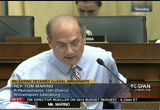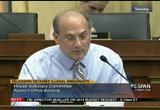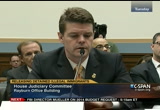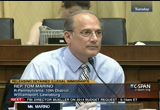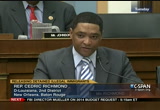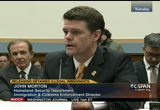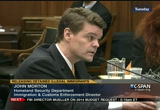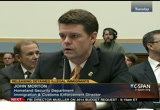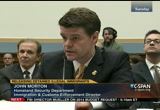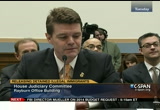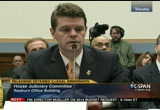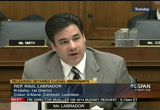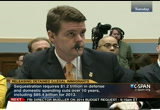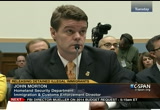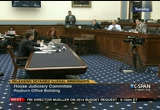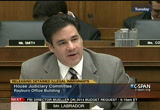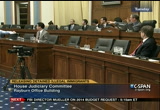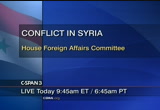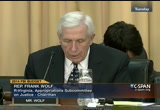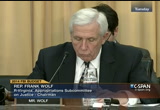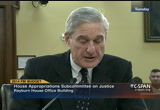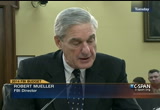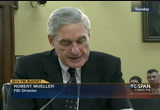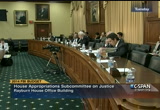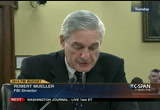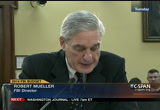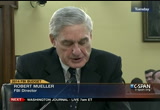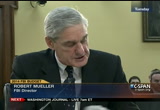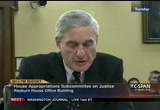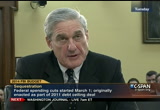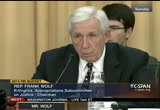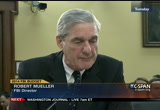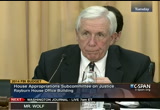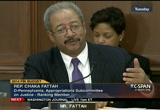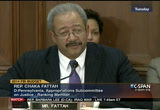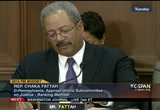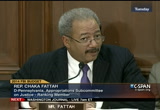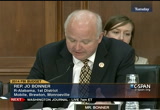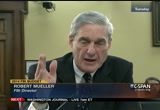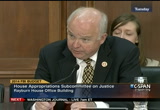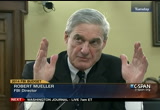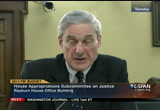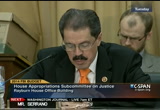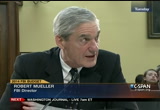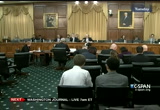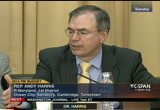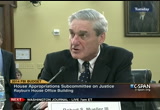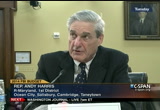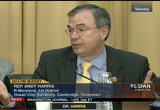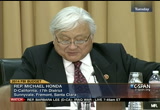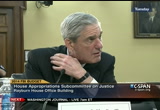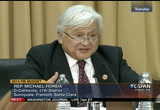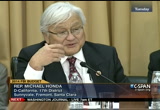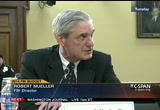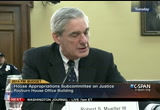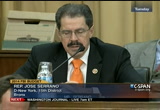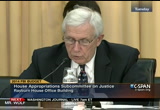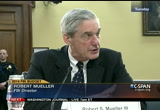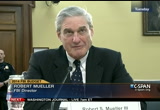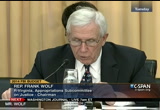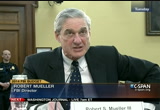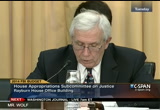tv Capitol Hill Hearings CSPAN March 20, 2013 1:00am-6:00am EDT
1:00 am
process and the goal of the board in reviewing this. in terms of the cost of implementation, how specifically it gets implemented, will have to get back to you. step. advisory board is a are there any steps needed before it can be executed or implemented? you, you cut and in like 18,000 separate law enforcement agencies in the united states. i'm not knowledgeable of how those categories are handled by independent law enforcement entities, what it takes to have those categories added and the information and put in each of
1:01 am
these law enforcement jurisdictions. i would have to get back to you. >> i appreciate that. i think the communities -- the communities also would. in terms of training, we have had this discussion about fbi staff training. the train was utilizing stereotypic erroneous information. we brought that to you, and you're telling us, you're looking at, making sure that these things would be eliminated and addressed. since then, i have heard a couple more times that certain regions have been doing that again. i would like an update on that train. in this area. tomade changes to that end my understanding, those changes have been adopted.
1:02 am
training meets the appropriate standards. if you have instances that you have heard that is not accurate, i would appreciate knowing it but i have not heard of any such instances. i believe that other entities emulated what we have done in terms of assuring the validity of our training materials curry >> they may have hired contractors to do the training. step to be a serious ensure they follow the rules. >> included a review of any contractors utilizing our allrials to assure that live up to our standards. >> i appreciate that. i'm going to go back to mr. serrano because he was cut off. i cannot know if anyone has
1:03 am
asked -- i do not know if anyone has asked, do you still have a programmer you take a new agents to the holocaust museum? >> yes. by predecessor initiated -- theredecessor initiated training to have the new agent exposed to the holocaust museum so they know and understand what happened in a renegade law enforcement entity. and understand that the heart of the bureau is the integrity, adherence to the law and understanding that [indiscernible] persons and that power has to be handled
1:04 am
carefully. to the extent it is not handled withully, then you end up happened prior to world war ii. >> i commend you for continuing the program. you're kind enough to give your predecessor credit but you could stop it and you did not hear you continue the program. we have great respect of which butort the work of the fbi as we have discussed, there is been times when the bureau did not do what it was supposed to do and many people were hurt. in my birthplace in puerto rico, there were some things done to some folks up was not proper things to do. when you continue this program, you do make a great site -- a great statement on behalf of
1:05 am
what is the proper behavior for the bureau and i thank you for that. about lack ofed public awareness about the threat of foreign espionage, especially among federal facilities handle export control but not necessarily classified technology. corn espionage as a major concern -- foreign espionage is a major concern here it last week it in response to questions about the website for the hon still times reported, the cold didmay be over but spying not end with it. far from it, says a spokesman for the fbi field office. secret generated by hon still -- by huntsville. they went on to say it is a major target. said doesman paul damon
1:06 am
you believe centers like target are specific -specific- centers are targets? what they are targets. -- >> they are targets and recognize that as a significant threat. we have a program called agent in the lab where we host agents to 17 of the research facilities and laboratories around the united states. they are embedded in research facilities to better understand and address that threat. a national security .igher education advisory board the leaders ofte these universities as to the
1:07 am
occur at our can target their research facilities. i would say probably has gotten exacerbated in the realm of digital information and cyber attacks. you no longer have to rely on an individual becomes your asset to gather the secrets in the cyber arena. it is just as easy to have somebody familiar with a cyberworld sitting in shanghai are beijing where some place in russia to attack the networks and export the information. a third is more substantial than it was a tenor 15 years ago. substantial is more than it was 10 or 15 years ago. rote to youto -- w
1:08 am
about security lapses at the nasa centers. i saw that the fbi and dhs were involved and in the apprehension of a credible individual being held. you have any comments about that case? think it is indicative of the threat he mentioned. the arrest occurred over the weekend and is now in of the court proceeding . happening at nasa langley and i saw your testimony last week's with regard to clapper with regard to china, ames or be happening at places?rd or other
1:09 am
has anyone taken a systematic look at it? >> we do have -- we have a number of investigations ongoing but in terms of a systematic review and being undertaken, i would have to get back to you. i am not aware myself of a systematic review. theif you would get back -- individual at langley was paid for by taxpayer money. the attack jarrett subsidize him if it could be happening at langley -- if you could look at that and get back, i would appreciate it. gangs.stions on a recent bulletin produced by the national gang intelligence been noted there have
1:10 am
growing numbers of violence in as in thewell midwest. do you believe the national gang intelligence center serves an important role? >> i do. >> do you believe these gangs have any connections to terrorist groups like al qaeda affiliate's and is there concern they might sending members to join? a number of individuals from the some of the community -- from the community and elsewhere somaliacountry went to to join al-shabaab.
1:11 am
i do not think we have found that related to the radicalization. aswas more happenstance opposed to the candying a fertile field for recruiting for al-shabaab. >> most of the sudanese i know of come here to escape the bashir administration. who are they? >> i am much more familiar with the somali community than the sudanese community. that is the first i've heard about sudanese gang members perhaps being recruited for work overseas. >> can some look at it and let us know? a number worsening
1:12 am
gang trends. of prison a street gangs, alliances with drug- trafficking cartels, rapid cell increasingin prison, use of summer -- up e-mail uselitator's -- increasing of a female facilitators. does that all ring true? >> yes and it has for a number of years. >> is it growing were decreasing? grown over theas last few years. a spent time and a california, number of gang members ended up with the pelican bay in northern alifornia and ran their gangs from inside the walls.
1:13 am
thank you, mr. chairman. director mueller, welcome. thank you for coming before the subcommittee today and i thank you for your service to the country and for your professionalism in running the fbi. the nationalates and state criminal background check system -- the fbi operates the national and state criminal and background check system. we have to enforece the laws that we have . even the momentary glance at the laws we have crews there are holes and in our system that even without -- that even with adequate enforcement would not keep guns out of the hands that seek to do us harm. i'm focused on the fact that those on the terror of watch a flag in theaise system. what are those on the terror and
1:14 am
watch list and not automatically denied a fire arm from italy and licensed firearms dealer and to the person listing -- and should it persons listing on the list be a factor in the denial of a firearm? >> the reason those on the terrorist watch list [indiscernible] one of the factors is listed in the statute. legislation being discussed in terms of what more can be done to expand these prohibitive factors or to expand it and other ways the use of nix to bar the sale of guns. >> so it person can be on the
1:15 am
terror watchless and yet we have to pass legislation to ensure that a person on that list c an't purchase a gun to request that is my understanding nouri >> the president has indicated he plans to devote additional resources in this fiscal year to help states provide more information to the federal databases used in nix background checks. how what you think it will take? how much funding to make the database is complete enough to have confidence that prohibited individuals are not able to purchase guns from licensed dealers? have you seen a graeter effort -- greater effort by states t since sandy hook. >> i would have to check whether we have seen an uptick in terms
1:16 am
of the information from states. generally we do after something like a sandy hook. it and differs from state to state. i would have to get back to you on that. concerned that cut -- the sequester could impact the ability of the fbi. those who should be restricted from having access to firearms could be able to make the purchase kerry what happens when it prohibited purchaser is able to complete a fire arms purchase because it takes longer than three days to resolve the eligibility question? is the fire arm retreat from that individual? how long does that take? a substantial
1:17 am
increase in aircraft for checks we have had a substantial increase in requests for checks since sandy hook. thwe have been able to the requests7% of were resolved within three days. if it's resolved against the person having a weapon, then it and it had to atf retrieve that weapon. >> would like to continue this discussion with you at another time but i have one other issue. it came up at another hearing i attendedn.
1:18 am
d. last week the department of justice inspector general testified before the subcommittee, spoke on the importance of encouraging private businesses to invest in their own network security and to report incidents of cyber and --asons -- fiber intrusions cyber intrusions to the fbi. help the fbi learn more about cyber. bring us up to date to the challenges. wake wake 9/11 -- in th established had to joint terrorism task forces throughout the country. when it comes to the cyber
1:19 am
arena, the key partner in the private sector. working hurdles rtto together that we have to overcome. one is i look -- one is liability. some argue there issues with regard to the antitrust laws get together and shares information than shares it with us. there are issues relating to the loss of the proprietary information, if they share it with the federal government. we are working through those but if we are to be successful in this realm, we have to develop mechanisms of channeling information between the thought -- between the private sector and federal enclave to participate and the bedside attacks and identify those responsible for those attacks and to make certain they are
1:20 am
deterred from the additional attacks. >> thank you. it seems it is a question what can be done now and if this are you really from a good relationship with the private sector? thank you bear much. >> i have heard this is a growing concern about gangs in the u.s. military. does the dod participate in the national gang intelligence center? >> i would have to check to the the personnel assigned.
1:21 am
i do know that we were work -- we work cooperatively with the military to address things that may be on the feet and also in the military. particularly in cases where there is indication the gang activity is not mullah gated to just the community -- is not relegated just to the community. we have enhanced our cooperation in that regard. for dod tokes sense to dissipate with one person over there? >> i would have to get back steve. to assure there is the exchange of information and intelligence. thank you, mr. chairman. director mueller, thank you for that sector -- the superb job you have been doing at the fbi.
1:22 am
dnapoke about using technology to solve serious crimes. there was a period when the crime lab had a backlog of offender dna samples. it was a lot of work but by investing technology, the fbi has clear that backlog. the report from 2010 down there was a substantial f.b.i. dna -- casework back log. i want to commend you and your staff for bringing that up to date. there are many state and local crime labs around the country that have not been as successful as the fbi and i hope that you and the fbi lab compaore tis
1:23 am
sharing the lessons he learned about clearing your backlog with the state and local governments. i wanted to touch on a familiar search which we talked about before. this is a message -- a method to determine if dna from a crime has a relationship to someone in the offender database. was of the best case gramm sleeper who murdered women over the course of decades. i deduced legislation last year and intends to do so again, asking the fbi to increment securities on a national database. we were lucky in the gramm sleeper case. if the killers son had been arrested in nevada, we would not
1:24 am
and there mayhit have been subsequent victims. i hope we can get the bill to the floor of this progress. he voiced support for the .echnology the you have an update on the progress towards the findings of the working group that have been studying it? >> there is a prosecutor and law enforcement entity that would not be supportive of a mechanism such as this to identify a person responsible for such horrendous crimes. the three things i should
1:25 am
legislation will continue to support. i do believe that would take some statutory assistance to push it through. controversialat development for new technology. those were concerned about privacy rights and the like have substantial concerns. the scientific working group on meetingysis has been and has recommendations. we expect those to come out this summer, perhaps in july. we are looking at designing and out a rhythm we can use of the conduct such to
1:26 am
searches and do it appropriately. >> do you have a sense of when that technological work will be developed? we have done in california, a number of other states have it. by anyot that difficult sense of a time line? >> i will have to get on -- get back to you on that. not. >> my hope as we can take some action later this year. on the subject of dna, i understand that biya has been --
1:27 am
i understand the fbi has been utilizing this. a police officer with simple channing can take a dna sample themselves and have a profile within 90 minutes. with alice officer simple training can take a dna sample themselves and have a profile with and 90 minutes. the time when dna will serve even more directly as a method of identify and arrestee is rapidly approaching. this is a technology many are not aware of yet. they have been put as pitting in testing. i believe this can be powerful tool. i also understand that the dna identification act would [inaudible]
1:28 am
do you expect the department to ask for an amendment to that law? uncertain about the impact of that legislation and what that justice department is doing. this summer, this petition their rapid dna will bentley biya booking stations when you go in the same way you take fingerprints. i would have to get back to you on legislation. as i understand it, he needed independent verification by an outside lab and that cannot be done in the 90 minutes in which to do a rapid dna test. i would think with the technology is ripe, we will work
1:29 am
.ogether on that >> i understand the catch-22. testimony you discussed the theft of intellectual property and trade secrets. a much more public debt over occurs every day from rampant piracy. committee is prosecuting these cases and i hope you will continue to make ip and piracy a . reminder to go but into a study released by -- released. period ked at the
1:30 am
following the seizure of mega uplaod. researchers study movie trends before and after the indictment and arrest. h one time, it was the 13t most popular site on the internet, went off line. down muegegehutting a couple did not stop all some are willing to switch to a legal channels as a result. what to commend you for the success. do this or -- this
1:31 am
1:32 am
why are they not togeterh? be intellectual property to moving, a song, a military secret. something stolen from a universe of a. it seems that if you combine to addressrk with us cyber attacks. i suggest that we should be looking at them as one grouping should have the support of private entity in those efforts. >> i agree. we are getting our house stolen in front of us.
1:33 am
accidental cyber attacks. i think we're close. somerivate-sector have concerns about their liability but at the same time, the private sector does provide sopiration to the government why not provide the same corporation? i think we're pretty close. there are some remaining issues --ut as responsibly in this about whose responsibility is to remove certain and permission.
1:34 am
1:35 am
. -- includes funding to procure a comprehensive external review of the accommodation of the recommendation lead to the fbi that [indiscernible] .t also include a response the language requires is a mission no later than one year after the enactment. it was a good amendment. we say the i would hope that when this passes, i think it will.
1:36 am
i cannot think we need another 911 commission but we had a plan which to draw upon experience of and i think those individuals will be good. alookould have to tak e at it. those two individuals have -- [indiscernible] eant to be any criticism. includes five with thousand for a comprehensive to carry oncurred
1:37 am
this review -- the fbi is encouraged to carry on this review. prohibits non investigated cooperation with the council on american islamic relations, care,. last year i asked the inspector general to investigate a number of instances with for sealed nd will not comply with this policy. could you confirm for the record policy prohibiting on ?nvestigative corp. >> it does. understand the last three years, the fbi has suspended any
1:38 am
formal engagement with care. correctly a pieta notify the committee article today in the new york times. syrian rebels. i was in love a non -- in andanon and egypt, giving people going across the syrian border. they were concerned of some the radical elements in the free syrian opposition. my sense is the administration has failed. they should been involved very early. may havedone so, we
1:39 am
1:40 am
muslim brotherhood, a group have been banned and persecuted under the assad government, and plays a powerful role. -- it goes on to say was concerning since i had all these different families of .he nominations of faith new headquarters. the need for a new fbi headquarters has been in the news lately. correct my understanding is jsa as received 35 proposals in
1:41 am
posted a new headquarters in building. can he bring the committee up to date? .n the status of the effort verye have grown out -- much outgrown our headquarters on pennsylvania avenue. t isn't -- the most architecturally public building. it is actually ugly, to be honest with you. but we have outgrown it and we have some like 20 entities brown -- something like 20 entities around. be in the capital
1:42 am
region, near transportation and to assure that meets our security concerns. are 35nted out there applicants or proposals have been submitted. i'm not sure the timetable. i will have to get back to you on that. >> i have been concerned with the senate language targeted to go to a certain location. people ought to be open, nothing but an integrity. no one i trustly
1:43 am
more in the government and then you. essence, the circumstances placeent it to a certain your huffily when you talk to gsa been pending for some time due to a lack of funding, specifically the central records complex. can you describe the need for these products -- for these projets? need the extent that we will have to look of
1:44 am
moneys from quantico for other funding. we have been something wanted to accomplish for a number of years, to modernize in one place. records are so important to the work we do. i'll have to get back to you on where we are specifically with these of the things that are going to be affected. >> could the other two be part package? my understanding is that whoever is successful on the bid, 11 procure.ty to i was wondering if you cannot do .ll three together
1:45 am
look atl have to take a that. i see your point. >> i think it's about the lack benghazi andin apprehending am bringing to justice those as possible for the talk -- the attack. we are now beyond the six month date. problemsperience getting access to the state initially. you went to libya in january. we satisfied with the pace a result of the investigation? hurdles at the outset. in gauzy did not have a good laws forced element -- benghazi
1:46 am
did not have a good law- enforcement. overcome many of those hurdles with the help of libyan authorities to of exhibited a to support us in our investigation. i met with the prime minister and i assured his support. i met with him when he was here again last week. the question is not necessarily the wilderness with the capability. we are working on that. the investigation is progressing. interviewed a number of witnesses. >> my was in egypt two weeks
1:47 am
ago, i gave him a letter specifically asking president marcy -- morsi to allow the fbi to interview the person they have in custody. given access ton the and the total -- to the individual jamal? >> no, not yet. your peoplemmend going out there. your people were in tunisia waiting for five weeks. >> they were and tripoli for a long time. .n tunisia
1:48 am
i hope i would have the support of the committee but we mark up. i think it is unacceptable. we lost four individuals who gave their life serving our country. the very thought that our problem will give the foreign aid to the morsi government and not having the fbi having access to that individual is unacceptable. anne patterson told issue would secretaryo thomas kerry was going to raise it.
1:49 am
>> on friday, a federal judge in california to clear the -- declare the letters unconstitutional. on thehave any comment fbi's use of national security letters and your use of them as a tool. the article told in terms of establishing a predicate -- they are essential tools of in terms of establishing a predicate. without them, we would be working without - with one hand tied behind our backs. could just invent a stethoscope stayed the ruling
1:50 am
1:51 am
get at intermission and would thosely undertake counterterrorism investigations. -- cyberhe cyber rena we impact our ability in the arena as well. the alleged al qaeda spokesman who i think was osama bin laden's son in law was arraigned for conspiracy to kill u.s. specialists. why is this an appropriate approach? much of this would be difficult to get into in an open
1:52 am
1:53 am
the resulting inconsistent -- there is something inconsistent. every time there's been a question asked, they usually say this is an open domestication nt. we cannot comme the thought that the investigation chilled a walkway awki with id joan -- is being ne, eone, apprehended by using the fbi. you can't go in downtown benghzai and knock on a door and get a warrnet. it just seems like there's two
1:54 am
different approaches being taken. in one, the drone was used on al alawki. >> if you want to comment, i would love to hav eyou comment. >> i am not certain one should say we are utilizing one approach to the exclusion of the illiterate everyone of these situations are a bit different. there are occasions when it goes -- route and others go [indiscernible] initiatedigation is then determine the options after
1:55 am
worth. the expectation is we want to gain of the intelligence we can to prevent the next. terrorist next then you have to have an end game on the individual you have attained. there are a variety of options there. i would say each of those options are on the table whenever we address a situation like this and we choose the best that will maximize our ability and a sure the person we have detained faces some charges -- and make sure the person we have detained faces some charges. >> two more then i will go to mr. fattah. last year we discussed domestic rivals 6 -- radicalization. what are the latest trends and and charges are
1:56 am
what you having countering this threat? beenthink we have successful stopping the larger attacks. i never say it's not going to happen but what we have seen is persons radicalized on the the lone generally engage in some form of activity. we have had some under caver -- under cover cases where persons toe been investigated, gone trial and successfully prosecuted in this arena. se arealone will -- the the lone wolves.
1:57 am
we have been successful using the same tactics for white- ollar criminal cases in terms of surveillance, using forensics and identifying the person then yo escort -- then to thwart an potential for an attack. there are reaching out to anybody else which would in a lot to identify or alerts them. it is an increasing trend. traditional our techniques will continue to give us some success in this arena. -- shifting a bit, does the recent legalization of
1:58 am
marijuana at a colorado for washington state -- how does fbi and thethe dea? you are embalms into these cases -- you are involved the death of these cases. still participating in task forces and the like. i really not certain what if any impact it would have on the work we do or the dea does. >> you have had a long struggle to develop and implement the fbi's case management system sentinel. can you bring us up-to-date on deployment? what are the benefits and what if any challenges remain? lost a cent to last july -- julyunched a sentinel last
1:59 am
and i think it is an unsuccessful. still integrating other databases steven not have to cut and paste information from one to the other. received by well those in the field. we continue every four months, we have an upgrade that provides new versatility. the program was successful and it was done at or about the cost established for a number of years. let me -- >> can i just add one thing?
2:00 am
sentinel further in giving ages the tolls -- tools is tremendously important to the budget constraints where we have to rein in what we're doing can adversely affect our ability to give the agents and analysts and workforce the tools they need to stay ahead of those who seek to do us harm. >> let me start here. you have had is it -- you have had a distinguished career. certain to the marines. i want to offer prayers to the families of the marines who died at then the explosion center in nevada.
2:01 am
. know the chairman shares that to this article 3 courts. you have handled hundreds of terrorism cases. this has been over a number of presidential ed ministrations. so these courts have been able to properly adjudicate these matters and to do that within the constraints of our judicial system. that does not take away that does not take away from any other procedures that might be available. when we'reained, operating in terms of
2:02 am
international law and the way that this particular individual came into being able to be detained was through inter col. i wanted to commend it administration for its aggressiveness in getting this person. a tax that may be planned by al qaeda -- attacks that may be planned by al qaeda. all of us should agree that the work that you have done and what the fbi has done since 9/11, really protecting the country against any massive domestic terrorist attacks, and all of your activities internationally, it has really been remarkable. not itscy, it was primary focus on 9/11, but as much of the country, we've had
2:03 am
to focus more intently on this issue. i do want to bring you back home. my final question is about the budget and appropriations and the department of justice. we imprison more people than any other nation in the world through our state and federal prison systems. 24% of the doj budget -- you are at about 29%. it will continue to rise. at some point, we need to think differently about what we're doing with people. i have constituents, family, children, we all want to be protected from dangerous people. a society ought to be protected. people involved in wrongdoing should be punished. at some point as a country --
2:04 am
that is why i mentioned the longevity of your career -- you're a prosecutor, you have been running the fbi, you have a view of this from a lot of different perspectives -- the committee is going to be wrestling with these issues over the next decade. the more people we lock up, the more people we put in prison, the greater share of this budget is going to be taken up through dop. at the same time, agencies like yours that are trying to protect our country from terrorists as a number one responsibility are going to be shrinking relative to its portion of the budget. the chairman has been the biggest supporter of the fbi then -- that congress has ever seen. i have seen him in private rooms when there are just four of us sitting down. he is always fighting on behalf of the agency.
2:05 am
the question becomes, as a country, as a society, you have any thoughts about going forward how we make a clearer delineation about who we might want to put in an expensive prison cell and spent tens of thousands of dollars a year to keep them locked up, and others who we might have to think about some different approach in terms of seeking redress or punishment for their transgressions? this is more of a full cycle question. i would appreciate your question -- your comments. a philosophical question. i would appreciate your comments. >> is more of a cosmic questions. i can only speak for the fbi. i think you and others on the subcommittee, the support you have given to the fbi. the fbi has to change over a period of time. are there a number of ways of
2:06 am
resolving a particular case of imprisonment or deportation? another candy house arrest. there are a number of particular dispositions. -- can be house arrests. there are a number of particular dispositions. i hope everybody understands the fbi has to change with the threats. we have to be nimble. that requires a focus on priorities. we have a lot of jurisdictional capability, but we have to prioritize and make certain we prioritize on the largest threats to the community, whether that be a mortgage fraud, fraud on wall street, public corruption, or civil rights abuses. we need to make certain that we prioritize, make certain we are focused on the greatest threats to the american public, and to
2:07 am
the extent there is a determination as to what the ultimate resolution of an investigation or case is, that is in the hands of the prosecutors of the department of justice. >> thank you. i appreciate his question. what we're going to do, we're going to introduce a bill --i'm going to ask your comments on that -- after the recess. it is going to be bipartisan. we will set up a national made up of mainly prison experts, particularly in the states, many of them very conservative, some liberal, who have had to respond to the crowding, the prison crowding, more as an economic issue than any other. it will be bipartisan. we're looking for a chairman or
2:08 am
somebody of stature who can take a year and come back and report. i think our prison system is dysfunctional in the sense that very few people working in the it has beenstries, decimated, partially because of the congress. we have tried to get the bureau of prisons to adopt programs that allow them to make progress that is no longer made in the united states. there are only two baseball cap manufacturers left in the u.s. every baseball team, every college, you would hope there were bought from an american company. what do you think about having a national commission, not right- left -- i am a conservative republican, he is a liberal democrat -- >> i resent that remark. [laughter] >> what would you think of that?
2:09 am
a great person to named after would be chuck colson. he was kind of a mentor. he went to prison, became a believer, spent his christmases in prison, easter's in prison, right up until his death, he was visiting prisoners. prisoners loved him because they cared. what is your thought about putting together a bipartisan commission about looking at this to release the, what we do particularly, because in the reprogramming, a large portion of the money we approved, $118 million, came from the fbi to give to the bureau of prisons? what are your thoughts about looking at, what we do, are we doing it the best way, should
2:10 am
there be rehabilitation, should there be drug treatments? >> this is the first i've heard of it. i have not given much thought to it. i think an independent look would not at all kurt. by independent, i mean an independent objective perspective to look at certain aspects of incarceration -- two big challenges -- who and what. who did it, and what would be a specification so that it is not a wide-ranging enterprise or initiative, without the possibility of coming back with some recommendations that can and should be adopted starting smaller with a specific, defined set of goals and parameters and an independent look, i do not think that could hurt.
2:11 am
>> that is my last question. again, this is probably the last time you testified before this committee. i was called off the floor the other day. i said, i understand director mueller will serve for two more years. what is your position? theid, i will speak for bill. i think you ought to talk to mrs. mueller before you present it. thank you and mrs. mueller. thank you to the bureau. the hearing is adjourned. >> serious government and opposition forces accused each other of using chemical weapons and with the northwest region of the country. tomorrow, robert ford to testify about the on going to go your conflict. live coverage begins at 9:45 eastern on c-span 3. later in the day on c-span 3, been bernanke will hold a news conference at -- after the
2:12 am
federal reserve's two day meeting on the economy wraps up. that begins at 2:30 eastern time. >> coming up, the head of immigration and customs enforcement testifies about the release of nearly 2000 immigrants because of budget constraints. the 2014 budget plan put out by chairman paul ryan would balance the budget in 10 years and put in place medicare changes. the chamber should finish work on boating on the measure on wednesday. here is tuesday's debate. mr. ryan: i bring forward and present the budget resolution for the fiscal year 2014. we believe that we owe the american people a responsible balanced budget and that is precisely what we are bringing to the floor today. our budget balances the budget within 10 years and it does so without raising taxes. balancing the budget will help us foster a healthier economy, it will help us create jobs. in fact, two leading economists
2:13 am
released a study analyzing our budget and its positive effects on the economy and jobs. in the first year they said it would, quote, boost the economy immediately, increasing both of our economy by a whole percentage point which translates into about 500,000 jobs. by the end of the budget window, according to these economists, it would add 3% of economic growth to the economy. that's 1.7 million jobs in one year alone, about $4,000 more in take-home pay because of higher economic growth. more take-home pay means more control, nor prosperity, more freedom for american -- more prosperity, more freedom for american families. we are not balancing a budget because we like to look at spreadsheets. this is not an accounting exercise. the reason we are balancing the budget is to improve people's lives, is to bring needed health to the economy, to bring certainty to families and
2:14 am
businesses so they can get ahead. we know that a debt crisis is coming, mr. chairman. we know that it's coming because we've watched what other countries have done when they it to kick the can down the road and ignore the tough choices they need to make to get our fiscal house in order. we're doing that. now, what are we trying to do? specifically in our budget? we want to restore opportunity. we want to repair our broken safety net so they're designed to get people out of poverty onto lives of self-sufficiency by reforming our welfare programs. we want to make sure that seniors who are relying on programs like medicare actually get the benefits that they organize their lives around. we want to make sure that the next generation, those that follow our parents into retirement, actually have a medicare program we can count on and we have those bipartisan reforms here. everybody needs to pitch in. everybody needs to propose a solution to our problem. because, mr. chairman, if we don't tackle this fiscal problem in america it will tackle us. now, to their credit, the
2:15 am
democrats on the budget committee are bringing a budget to the floor. to their credit the progressive caucus is bringing a budget to the floor. to their credit the black caucus is bringing a budget to the floor. to their credit the senate finally for the first time in four years is bringing up a budget. budgets are about choices. the problem we have is not now they're doing a budget. that's good news. that's great. it's what's in their budget. if you take a look at our budget, as i mentioned, our budget balances the budget. we believe a balanced plan is one that actually balances the budget. there is not another budget that's being offered here other than the study committee budget that actually balances the budget. other points notwithstanding. now, why do we balance a budget? because we don't want our children to be drowning in debt. we want to make sure that this sea of red ink that the c.b.o. tells us is coming, we pay off our debt and give our kids a
2:16 am
debt-free country. that's what we do. if you take a look at the other budgets being offered -- let's take a look at the senate democrats, there's a tax increase $1.5 trillion, that has a spending increase of about $4.8 trillion off of our budget. if you take a look at the house democrats, that's a $1.2 trillion tax increase with a spending increase of about $4.896 trillion off of this budget. if you take a look at the black caucus budget, the c.b.c. budget, that's a tax increase of $4.7 trillion. not only to be outdone by the progressive caucus budget. tax is a $5.683 trillion $8.869 with an trillion spending increase in their budget. taking more money from hardworking families to fuel more spending in washington is not going to solve our budget crisis, is not going to balance our budget.
2:17 am
it's more of the same and more of the same means we have a debt crisis. and when we have a debt crisis everybody gets hurt. the people who are on the safety net, the seniors who already retired, they are the ones who get hurt the first and worst in the debt crisis. this is a responsible plan. it's a plan for economic growth. it's a plan for tax reform. it's a plan to open up our energy stores that we have here so we can be energy independent. we have vast amounts of energy reserves we need to tap so we can put people to work, bring down gas prices, stretch paychecks further. we've got to control our spending appetite. we've got to reform programs like medicare so they're solvent. we've got to reform our safety net so it works to get people on their feet. that's what this budget does. in a nutshell, instead of spending $46 trillion over the next 10 years, as we're currently poised to spend, we spend $41 trillion. instead of growing spending 5% a year we grow at 3.4% a year. with all the predictions of
2:18 am
doom and gloom and how evil and terrible and horrible or budget is, it increases spending every year by 3.4% a year instead of 5% a year. the difference is we balance the budget. the difference is we let families keep more of their own take-home pay. the difference is we make sure our kids inherit a debt-free future. the difference is we do what's necessary to create a healthy economy, more take-home pay, faster economic growth and better jobs. that's why we're here to balance the budget. and with that, mr. chairman, i reserve the balance of my time. the chair: the gentleman from wisconsin reserves. the gentleman from maryland. mr. van hollen: thank you, mr. chairman. you know, last fall throughout this country we had a vigorous debate. president obama laid out his vision of how we deal with some of our big challenges with respect to the economy and the budget. governor romney did the same thing. and both of them said the american people faced a very important and fundamental
2:19 am
choice. and the american people chose. they chose to support president obama's vision of accelerating economic growth, putting more people back to work, taking a shared responsibility approach to our long-term deficits so we bring them down in a balanced smart way and they rejected the idea that we're going to move the economy forward by giving windfall tax cuts to the very wealthiest in the country and the benefits of that would trickle down and lift everybody up. they rejected that lopsided approach that balance the budgets on the backs of everybody but the folks at the very top. balance the budget on the backs of our kids' education by slashing important investments. in that category of spending we make these important investments for our country and our future, they double the cut from the sequester. so those are our investments in our kids' education.
2:20 am
those are our investments in science and research to help power our economy. those are our investments to help modernize our infrastructure. they cut transportation by 15% when we have 15% unemployment in the construction industry. so mr. chairman, the american people rejected the kind of uncompromising lopsided approach that we see once again presented here in the house. the same thing we've seen for the last three years as if we hadn't even had a debate last fall. now, in the democratic alternative, we focus on the main issue right now and in the future. we don't only want strong economic growth in the future, we want to see accelerated job growth right now. you know, we've seen some momentum in the jobs market in the last couple months. but the republican budget, it will put the brakes on that
2:21 am
growth. now, the chairman of the budget committee can quote what economists all he wants and there are economists that say it will do this or won't do this or will do that, but we have an empire in the congress, we have a refugee. they are called the congressional budget office. they're nonpartisan. they're independent. they tell us that if you follow the approach of the republican budget and keep the sequester in place through the end of this year that by the end of this year we will have 750,000 fewer americans working than otherwise. why would we want to do that? they tell us that if you take the approach followed by the republican budget that economic growth this calendar year will be cut by 1/3. why would we want to do that? because the congressional budget office also tells us that a full half of our deficit
2:22 am
this year, half is as the result of the fact there are lots of people looking for work who haven't found a job and they project that 3/4 of the deficit next year in 2014 is as a result of the fact you have too many people that are unemployed. so let's attack the root of the problem right now and help put people back to work rather than put the brakes on the economy, and that's what our budget will do. this calendar year in addition to preventing the 750,000 loss, we will generate another 450,000 jobs by investing in the economy. and next year the difference between our plan and our colleagues' plan is two million jobs. two million more jobs under our budget proposal. so we believe that you got to deal with the budget deficit and at the same time you also need to focus on the jobs
2:23 am
deficit to help deal with the budget deficit. now, we also reduce the deficit in a steady, sustained way. we do it with balance. we do it with targeted cuts, but we also do it, mr. chairman, by eliminating some of the tax breaks and tax expenditures for very high-income individuals. we heard from governor romney and we heard from the chairman of the budget committee last fall and this year that there are trillions of dollars of tax expenditures that disproportionately benefit very wealthy people. so the republican plan, they said we'll get rid of your tax expenditures for high-income people, but we'll bring down your top rate. so in the end the folks at the top get a very big windfall. we say let's eliminate some of those tax breaks for very wealthy people in order to help reduce our deficit, so when you combine that savings with targeted cuts, you can reduce
2:24 am
it in a balanced way rather than increasing the tax burden on the middle class which is what their budget will do. we also want to make sure we keep our commitments to our seniors and not transfer the risk and costs of rising health care costs onto the backs of seniors, as the republican budget does. we don't reopen the prescription drug doughnut hole, as the republican budget does, which means seniors with high prescription drug costs will end up paying thousands more out of pocket over the period of this budget. we in our budget make sure that student loan interest rates, which are set to double in july from 3.4% to 6.8%, we make sure they don't double. the republican budget makes sure that they do, and that will make college less affordable to millions of students. so, mr. chairman, let me conclude by talking about the
2:25 am
deficit impacts, because the republican budget does hit this -- they'll hit this political target in 10 years. but it's a hoax, because they say when their budget balances, they'll repeal all of obamacare, all of the affordable care act. the reality, mr. chairman, is they get rid of all the benefits of the affordable care act, so the millions of americans who would have had more affordable coverage, they won't get it. and the people who will no longer be excluded from getting coverage because of pre-existing conditions, they'll make sure that they're decide coverage because of pre-existing conditions because they take away the benefits. but the dirty little secret, mr. chairman, is they keep the savings from the affordable care act, from obamacare, and without those savings that budget doesn't balance.
2:26 am
so we did what our republican colleagues say they want to do, which is like this instant repeal obamacare, they wouldn't have a budget that was in balance. you don't have to take my word for it. the heritage foundation just issued a statement. very conservative think tank. quote, perhaps the biggest shortcoming of this budget -- meaning the republican budget -- is it keeps the tax increases associated with obamacare. it keeps those. it keeps all the savings in medicare that were achieved as part of the affordable care act, where we achieved them by reducing the overpayments to the private insurance companies by changing the incentive structure to focus more on the quality of care rather than quantity of care. you remember all those medicare savings that we heard our colleagues demagogue in the last election last fall, they keep all those savings, and their budget wouldn't balance
2:27 am
without them. now, our budget dramatically cuts the deficit, makes sure that we're -- our deficits are not growing faster than the economy, down to 2.4% at the end of the window. we stabilize the debt below where the c.b.o. projects today. we stabilize 70% of g.d.p., and, yes, we also will balance our budget in the same year that the republican budget from ast year balanced. if this were just a race to balance the budget first, vote for the republican study group proposal. four years. but if your priority is jobs and economic growth, as it should be as part of a measured and plansed approach to reducing the deficit, then you need to support the democratic report. i yield -- i yield back the plns of my time. the speaker pro tempore: the gentleman from wisconsin. mr. ryan: the gentleman from
2:28 am
maryland is right, we do balance the budget. guilty. proud to be fwlt of that. we think balancing the budget is important. more to the point, in the revenues we're saying, we don't like the current tax code, we can raise the sam amount and have a better government that's pro growth and that does not include the obamacare tax bus includes replacing the current revenue code that hurts jobs and hurts economic growth. with that, i'd like to yield three minutes to a senior member of the budget committee, the gentleman from new jersey, mr. garrett. the speaker pro tempore: the gentleman is are -- the chair: the gentleman is recognized for three minute sms mr. garrett: i rise because today's budget is budget that helps american families. i rise to support a budget that recognizes that the status quo is unacceptable to american familyly -- families and up sustainable for the economy this budget before us now will restore much-needed certainty, certainly to the economy, promote fairness, provide those american families with the
2:29 am
opportunity you're looking for to prosper. importantly this budget stops spending money that we simply do not have and at the same time it advance what is a commonsense -- what are commonsense changes and proposals to strengthen our nation's safety net programs nd we do that for american families. it takes a step toward reversing the path to debt and decline, the one the president and his fellow democrats vlade out for the american public, in order to say that president obama and the democrats over in the senate, to say they have failed to lead this nation in what is probably one of the most predictable economic crises in our nation's history would be a drastic understatement. why is that? on february 4, the president's budget was due. march 19, the american people, they're still waiting. it was over four times in five years that this president has failed to pacecally follow the law of the land and submit a budget on time.
2:30 am
it's interesting that the president's brackets are always on time, his budgets, not so much. the senate democrats aren't any better. it took them almost four years to produce a budget that increases government spending by $265 billion, raises taxes on this country by almost $1 trillion and at the same time cut health care providers by almost $300 billion. over the period covered by the budget, deficits under the senate plan, they're going to be nearly $4 trillion. yes, $4 trillion larger than those under the house republican budget that we're talking about right now. look, every family, every family in the country, every family in america, they understand the necessity of having a balanced budget. the president, senate democrats, could surely learn by going back to their districts and learning from the examples of american families across the country in how to set a budget. you see, families they don't
2:31 am
have the luxury of rating for -- of waiting for the next election. they don't have the luxury of going through yet another cycle and quite frankly, as we stand here today in washington, neither does washington system let's stop the spending insanity and start putting the country back on track and do this for the american family. with that, i yield back. the speaker pro tempore: the gentleman yields back his time. the gentleman from maryland. mr. van hollen: i thank you, mr. chairman, i yield two minutes to the ranking member of the commall business committee who recognizes how important it is to keep our economy moving forward, not backwards. the chair: the gentlelady is recognized for two minutes. ms. velazquez: i thank the gentleman for yielding. i rise in strong opposition to this ill-conceived budget. for working families this tax of uld mean a $2,000 making it harder for
2:32 am
families to aed for rent and put food on the table. the dwmplet o.p. plan also shortchanges seniors, ending medicare in 10 years, equally problematic, the affordable care act will be repealed, reducing health care assistance to 176,000 families in my district and preventing 68,000 young people in my part of new york from staying on their parents' insurance. we can also expect our economy to take a hit. with two million jobs vanishing next year alone. is this what we need to get this economy growing again? and for small businesses, this budget will mean losses. 16,000 small firms in my district will lose tax assistance when purchasing health care. and thousands of would-be entrepreneurs around the country will see technical
2:33 am
assistance and other services right off -- dry up preventing the creation of new startups and blocking job creation. mr. speaker, mr. chairman, budgets should be about priorities. the american people reject that this flaw -- rejected these flawed priorities last year when they vote trode elect president barack obama. i urge my colleagues to vote no so that we can approve a budget that is balanced that is fair that will create jobs and that will move our nation forward together. i yield back. the speaker pro tempore: the gentlelady yields back. the gentleman from wisconsin. mr. ryan: at this time i would like to yield three minutes to the gentleman from arkansas, mr. cotton. the speaker pro tempore: the gentleman is -- the chair: the gentleman is recognized for three minutes. mr. cotton: i rise in strong support of this budget resolution. i want to take a moment to applaud the chairman and the
2:34 am
members of his committee andest peash -- especially the hard working staff of the committee for producing this document. a merry little band of less than 30 staffers. by contrast, the president work the vast resors at his disposal in the executive branch is now, i think, into the sixth week beyond his deadline in which he cannot pass his own budget. i assume he'll submit something, i hope we have a chance to vote on it, bill curious to see if my colleagues on the other side of the aisle can produce more than the zero votes his budget got last year. the senate is even worse they haven't produced a budget in four years. having seen the budget they'll vote on, i now know why they didn't produce such a budget. it has over $1.5 trillion in new taxes, almost a trillion recognized, almost $500 billion to replace sequestration in unspecified closures of
2:35 am
so-called loopholes and another $100 billion in unspecified closures of new and ultimately failed stimulus spending. it never reaches balance, ever. the only thick we hear on balance from the senate or the president is as a euphemism for new tax increases. and finally, i want to point out that the last time the senate passed a budget four years ago, i was a captain in the united states army, sitting at forward operating base in northeast afghanistan and i want to specifically single out the defense measures in this budget and to applaud, again, the leadership of the chairman on the budget committee for protecting our military, for giving it funding it otherwise would not have and the flexibility it needs to help protect and keep this country safe. the defense department is the one area in government where strategy should drive the budget, not the budget driving the strategy.
2:36 am
and in the second way that it protects our military from a debt crisis, this budget as we've heard is designed to postpone and prevent a debt crisis caused by out of control reckless spending, anemic economic growth of the kind you've seen in countries in europe already. if that were to happen, not only would it impact families all across the country, when their interest rates for mortgages and farms and small piss and education increases, but it also crowd out all other kinds of priorities in our federal budget, it would immediately impact as well our troops, their families, and our veterans. i yield back my time. the speaker pro tempore: the gentleman yields back his time. the gentleman from maryland. mr. van hollen: thank you, mr. chairman. actually, the republican budget does follow some of our european friends but follows them in the wrong way. the strategy places like the
2:37 am
u.k. have followed is an austerity approach, immediate, deep cuts, dwess what they did, that sent them back into a recession. again, the umpire around this place the nonpartisan congressional budget office in our republican colleagues' budget you'll have 750,000 fewer jobs by the end of this year. that is not a growth strategy. we cannot afford here in the united states the european style austerity measure that is hurting those economies. with that, i yield two minutes to the gentlelady from california, our ranking member on the financial services committee, ms. waters. the chair: the gentlelady is recognized for two minutes. ms. waters: thank you, mr. chairman. i thank mr. van hollen for yielding me time. today i rise in strong opposition to the republicans' budget a budget that makes absurd claims to reducing the deficit by repealing crucial government authority to
2:38 am
protecting our economy, lest we forget that lehman -- lehman brothers disorderly bankruptcy sparked the worst financial crisis in the country, the dodd-frank act specifically affect es regulators to the firm, and they conclude, erroneously, that this is a pailout. if dodd-frank did what the republicans say why does no large firm want to be designated systemically significant? the republican pr posal also suggests a repeal of the authority yen rates real savings to the american taxpayer. the dodd-frank legislation designed this authority to pay for itself over time.
2:39 am
with any initial upfront costs being completely recupid by selling assets and imposing an assessment after the resolution. on financial institutions with more than $50 billion in assets. the law specifically states that taxpayers shall bear in losses from the exercise of any authority under the liquidation title. once again, the republican budget is misleading and dishonest. the national journal has called the republican proposal a budget gimmick and even "the wall street journal" dismissed it as mere budget quirks. if the authority to wind down a mega firm is repealed, the american taxpayer will be called on again to bear the risk of another financial crisis like 2008 which the g.a.o. found cost the u.s. economy $13 trillion. mr. speaker, i urge all of my colleagues to reject this republican budget. i yield back the plans of my
2:40 am
time. the speaker pro tempore: the time of the gentlelady has expired. the gentleman from wisconsin. mr. ryan: let me yield myself one minute. the chair: the gentleman is recognized for one minute. mr. ryan: any friend from maryland said this plan will cost 750,000 jobs. that's an analysis done on the sequester starting with looking at calendar year january through calendar year tess, where are we? this budget doesn't deal with fiscal year 2013. it starts in october. o he's using a comparison of a statistic they use, the same kind of economic short-term analysis to say the stimulus would create millions of new jobs, they say the sequester will cost these jobs and it's a cut that's not even in this budget. more to the point, the senate democratic budget has the same appropriations number we have in our budget for fiscal year 2014. the point is, what the c.p.o. does say over the long-term is if you achieve the kind of
2:41 am
deficit reduction we are, a million new jobs a year by the end of the window. c.b.o. says that about this punt, about achieving this kind of deficit reduction. stanford economists. you can create a million jobs a year. you're seeing a consistent theme here, cutting spending, growing the economy, creating jobs. with that, mr. speaker, i yield three minutes to the senior member of the budget committee, the gentleman from california, mr. campbell. the chair: the gentleman is recognized for three minutes. mr. camp spel -- mr. campbell: thank you, mr. chairman. i don't know if you've been to spain or mot, i have, just once, it's a beautiful country. nice people, great food. at one time a large, vibrant, growing economy. but not today. today in spain over half of people under 25 years old can't find work. the unemployment amongst all ages in spain is about what we had during the great
2:42 am
depression, not the great recession, but the great depression of the 1930's. people on government medical care there can't get it. they can't get it when they want it because they had to close a lot of medical clinics in order to save money. they had to do that because they waited too long to fix their fiscal problems. they waited until they had a debt crisis. and then they had to do what my friend from maryland said, they had to impose an austerity program. raise taxes and cut spending very quickly. in a matter of just a year or so. that's what they had to do to continue being able to sell their debt. that, mr. chairman, is exactly what we don't want to do. this is not speculation, this is not something we have to think about. it's there for us to see, not just in spain, in greece, in cyprus new york japan in a
2:43 am
different form. it's there in other parts of the world. when people, when you borrow so much money the people won't lend you any anymore, then you put in this austerity which causes these problems. unfortunately, that is what my friends on the other side of the aisle, their budgets will lead us to, more debts, more deficits, kind of a sugar high. they'll say, we're going to create, spend all this money, create these government jobs, for a while, and we'll feel good until the debt crisis comes an then all that goes away. what the republican budget does is balances in 10 years and not so that c.p.a.'s like me can achieve some symmetry that makes us feel good, it's because when you balance a budget, you set this balance up, it frees up the economy. people know we're on that track to balance in 10 years, we won't have a dedebt -- a debt cry sice -- crisis, people know
2:44 am
we won't have a debt crisis, the economy is freed up from the burden of too much debt, of knowing that there's a problem with no solution, there will now be a problem with a olution. it would be freed up both on the government side and private sector and there would be more jobs and more jobs. that's what the republican budget promised. an economy that grows and sustainable job creation, not a one or two-year sugar high followed by a collapse. we've seen what not to do. we know the path not to take. this republican budget is the path we should take, and i hope everyone will support it and i yield back. the chair: the time of the gentleman has expired. the gentleman from maryland. mr. van hollen: thank you, mr. chairman. first, i want to point out again that our republican colleagues cannot have it both ways. you can't claim you're going to
2:45 am
balance in 10 years and claim you got rid of all of the obamacare provisions, because if you look at this chart, you will see that in the year 2023, 10 years from now, they claim a balance of about $7 billion right there. and yet if you look at this blue section here and the red section, you got the revenues from the affordable care act, from obamacare, and the savings from medicare that our colleagues campaigned against last fall but kept them right in their budget. and without those items, they come close to balance. $400 t, they're about billion short in the 10th year from balance. now, we believe you got to focus on getting the economy moving right now. that's why we call in our budget for getting rid and replacing the sequester now, so you achieve the same deficit reduction over a longer, more measured targeted period of time and don't do damage to the
2:46 am
economy. and we reduce the deficit in a steady way so that it's way down below the growth in the economy, by the 10-year window, and we do it in a way that is balanced, meaning we ask for shared responsibility. so we do it through a combination of cuts but also we do say for folks at the very high income ladder we can get rid of some of those tax expenditures, tax expenditures that our republican colleagues talked about, but to help reduce the deficit as part of a balanced approach. now, if you look at the math on the republican's tax reform plan, it drops the top rate for folks at the very top from 39% all the way to 25%. we know that's going to cost about $4 trillion.
2:47 am
they say they're going to make all that money up by taking tax expenditures away from high-income people. the math doesn't work that way. you are going to have to increase taxes on middle-income taxpayers or you're not going to hit your deficit target. one or the other. so in the budget committee we democrats said, look, let's say to the ways and means committee, when you do tax reform, don't raise taxes on middle-income taxpayers. and we had an amendment. got it right here. protect the american middle class from tax increase. we said if you are going to do tax reform, at least make the commitment you are not going to increase taxes on middle-income families in order to finance tax breaks for folks at the very top. every one of our republican colleagues on the committee voted no on that amendment. committee's got lots of policy instructions on other stuff, but a policy request, statement
2:48 am
about not increasing taxes on the middle class, they all voted no. so we believe we have to reduce our deficits in a smart and vigorous but also balanced way, asking for shared responsibility going forward, not violating our commitments to seniors by reopening the doughnut hole, not by shredding medicaid, which they cut by and which illion would be 1/3 less in 023 than it would otherwise be -- 2023 than it would be otherwise be, mr. chairman. 2/3 of medicaid spending goes to seniors and those with disabilities. so it's not a question of whether we reduce our long-term deficits, it's how we do it and we do it in a balanced way. if this was just a race to be the first to balance, then you should support not the chairman's budget, support the
2:49 am
republican study group, that other budget. but if your priority is to grow jobs and the economy, then you should support the democratic alternative budget, and i reserve the balance of my time. the chair: the gentleman reserves. the gentleman from wisconsin. mr. ryan: mr. chairman, i yield myself such time as i may consume to -- the chair: the gentleman is recognized. mr. ryan: quickly respond. so here's what my friend is saying, and i have three problems with what my friend from maryland said. i have a problem what he said in the beginning, in the middle, in the end what he said of all what is happening here. here's his plan for economic growth. borrow more money and go and spend that money. remember the stimulus? they're saying doing it again. then raise taxes. that's going to help the economy. oh, and it's a balanced plan. here's the problem. their balanced plan doesn't balance the budget. we actually asked the c.b.o. they're claiming they'll balance the budget in 2040. they are having to make
2:50 am
assumptions that the c.b.o. won't even back up to claim that they'll somehow balance the budget, but when i look at their deficits in their budget, yeah, they get the deficits going down in the first few combreers and then it start -- years and then it starts going back up. how do you tax $1.2 trillion, next increase spending and claim you're balancing the budget? look, we've been trying to do this economic program for a while. we tried the borrowing and the spending. that didn't work. we just hit the economy with a $1.6 trillion tax increase. the economy's not roaring right now. and what they're saying, let's o that all over again. we are saying fix the tax code, replace it with a pro-growth tax system that helps small businesses, that helps job creators, that helps families. get government spending's appetite under control.
2:51 am
the government is supposed to be spending 5% on average for the next 10 years. that's too much. that's much more than what the family budget gets. we sebring it down to 3.-- we say bring it down to 3.4%. when we look at all the smoke and mirrors, all the claims, none of the democratic budgets that's being brought to the floor ever, ever balance the budget. how is that a balanced plan? balancing the budget is what every family does. balancing the budget is what every business does. balancing the budget is what every local government does. surely our federal government can do this, and one of the key ingredients to growing this economy, to making american businesses big and small competitive so they can create jobs and create take-home pay is reform our tax system. with that i yield two minutes to the chairman of the ways and means committee who's in charge of reforming our tax system, the gentleman from michigan,
2:52 am
mr. camp. the chair: the gentleman from michigan is recognized for two minutes. mr. camp: i thank the gentleman for yielding and for his leadership on this issue, mr. chairman. i rise in support of a federal budget that balances so we can strecken our economy, create more -- strengthen our economy, create more jobs and allow american workers to start see an increase in their paychecks again. i know we can do it. i was part of a team, a republican congress and a democrat president, that balanced the budget for the first time in a generation. we focused on areas where we agreed and we made some tough choices and we should do that again. and balancing the budget is not just about the economy. it's about critical programs like medicare and social security and the benefits they provide to millions of americans. social security is already spending more money than it brings in, and the medicare trust fund is going broke fast. what does that mean? well, if congress and the president don't act, america's seniors will face significant benefit cuts. that means smaller social security checks, up to 25%
2:53 am
less, and fewer doctors willing to take medicare. so what should we do? first, we pass a budget that balances and that's what republicans are doing. the democrat substitute continues a policy of borrowing and spending and raising taxes and never gets to balance. our budget, with pro-growth tax reform, has been scored by outside experts to create a million jobs in the first year alone. second, we need to start making reforms necessary to save programs like social security and medicare. the president said he's willing to use a different formula, change c.p.i., to determine social security benefit increases. i know that policy will be included in the budget. it's an area of agreement between the parties. mr. president, if we agree, then let's do it. the same -- mr. ryan: i yield one minute. the chair: the gentleman's time has yet to expire.
2:54 am
one more minute. mr. camp: the same goes for reducing subsidies for wealthier seenons. the american people expect us to make progress where we can. let's not let our differences stand in the way, and if we agree on a policy, let's start coming together to start protecting critical programs like social security and medicare. with that i yield back the balance of my time. i reserve the balance of my time. the chair: the gentleman yields back the balance of his time. the gentleman from maryland. mr. van hollen: thank you, mr. chairman. you know, we actually have kind of a yardstick that we can use to measure whether these budget approaches have a balanced approach. meaning they ask for shared responsibility. you have the bipartisan simpson-bowles commission report. they said we should reduce our deficits in a steady way through a combination of revenue but also targeted cuts. this republican budget's totally lopsided. it provides tax windfalls to folks at the very top and
2:55 am
balances the budget at the expense of everybody else. what we've proposed actually, when you take into account the $1.5 trillion in cuts we made over the last couple years and the $700 billion in revenue from january and what we have in this budget, we actually have a higher ratio of cuts to revenue than that bipartisan simpson-bowles plan when you look at everything that's embedded in it. so that's measured against a bipartisan approach, and that ts us to where we need to be without hitting all the other priorities we have in our country. and with that let me yield two minutes to the gentleman from michigan, the distinguished ranking member of the ways and means committee who has looked at these numbers backwards and forwards and i look forward to his comments. the chair: the gentleman from michigan is recognized.
2:56 am
mr. levin: i ask unanimous consent to revise and extend. the chair: without objection, so ordered. mr. levin: this republican budget is tone deaf. the result of blind ideology. but you know, i've been listening to what's been said so far today, and the republicans say but they don't say how. we've just heard, we know we can do it but you don't say how. so what we come up with on the republican side is a mirage and i think a dangerous one. let me give you an example talking about their proposals on taxes. under their budget, the top rate is to be reduced from 39.6% to 25%. the a.m.t. will be repealed. the corporate tax rate will be cut from 35% to 25%. but you don't find one sill
2:57 am
bell in the republican budget on how these tax cuts will be paid for. . they don't identify a single tax policy that will end. the republican budget would mean a huge tax cut for the very wealthy, several $100,000 a year and leave a nearly $6 trillion hole in the deficit that would lead to tax increases for middle-income families. that isn't balance. that is total imbalance. at the same time, republicans propose cutting $3.3 trillion from programs for people with low and moderate incomes, including hundreds of billions of dollars for food nutrition and medicaid programs. so i want to end by asking the republicans when they come and talk about their tax proposals
2:58 am
to name a specific that they would address. it's not in the republican budget. name one, name two, name three. otherwise, it's worse than empty. the chair: the time of the gentleman has expired. the gentleman from wisconsin. mr. ryan: with that, mr. chairman, i yield three members to the gentleman from indiana, r. rokita. mr. rokita: i thank chairman ryan in bringing this budget to the floor. i rise in high support of it. i also am very proud, one of the highest honors i have had in my short time here to serve on this committee. not because of chairman ryan only, but because of the members. by members, i mean republican and democrat members. i know that mr. levin is not a member of the budget committee.
2:59 am
but there are great people who are. that's why and perhaps because of that pride that i'm disappointed to hear the ranking member characterize the accomplishment, because that's what it is, the accomplishment of balancing within 10 years as some sort of political goal. you know, families who are trying to put food on the table, associations, neighborhood associations, nonprofits, for-profit businesses, they have to make a budget balance every day, every month, every year. i think should be offended by that characterization. it's not a political goal. you know what's political? never balancing. you know what's political? the immoral idea that we are going to put more on our plate now, add up deficit after deficit and create a bigger and bigger debt and then make people who don't even exist yet pay for it. why is that political? because, you know what, mr. chair? the people in the here and now
3:00 am
can vote. generations in the future, our grandkids who don't exist can't vote. and that's what makes the other approaches we have heard about immoral, wrong political. we balance. we balance within 10 years. let's contrast that a bit. our responsible approach to what the senate democrats have done, for example. next year alone the senate democrat budget increases spending by $162 billion above what we are spending today. over 10 years, increases the delebt by $7.3 trillion from today's levels despite a massive tax hike that they have. and it adds $1.5 trillion in new taxes. even after that, they still add to the debt, our kids' debt by $7.3 trillion. and again, mr. chair, it never balances. after four years and $6 trillion in debt since a budget was last even passed, the senate
3:01 am
democrats' proposal leaves more debt and government that never stops growing. after four years, the democrats are unable to identify any real reforms, no tax reform and no entitlement reform and it's not a serious proposal. i stand again in support of the house budget because it's responsible, it's real, it balances in 10 years and it's the last thing from political. and i yield back. the chair: the gentleman yields back the balance of his time. the gentleman from maryland. van vanch you know -- mr. van hollen: you know what's wrong, mr. chairman? it's to pretend to the american people that you can have it all ways. what's wrong is to pretend that you have a budget that's imbalance in 10 years and pretend that you're getting rid all of the affordable care act, getting rid of obamacare. what's wrong is demagogging savings in medicare which we achieved by ending payments to
3:02 am
private companies. by demagogging that and using it to balance your budget and say you know what? we didn't use it to balance our budget. that's what people don't like. people trying to have it all ways. now, we have taken an approach to steadily and rapidly reduce our deficits in a way that doesn't interfere and hurt economic and job growth right now. and we do it in a balanced way. and what i find astounding, astounding is to hear our republican colleagues talk about the deficit and the debt in one breath and then talk about all those tax breaks and expenditures that disproportionately benefit very wealthy people in the other breath, and then say they won't close one single tax loophole for wealthy people for the purpose of reducing the deficit, not one dime in their budget for
3:03 am
that purpose. and yet, they're willing to hit medicaid to the tune of $110 billion. they are willing to hit the food and nutrition program by over $1 00 billion. they are ready to cut transportation funding by over 15% in this budget window and yet they're not willing to close one of those more than $4 trillion in tax loopholes to reduce the deficit. i think that's wrong. mr. chairman, i now yield two minutes to the gentlelady from pennsylvania, a member of the budget committee, ms. schwartz. the chair: the gentlelady from pennsylvania is recognized for two minutes. ms. schwartz: the federal budget is a statement of our priorities and values as a nation. the budget to be fiscally responsible and reduce the deficit. to make velft to grow our economy and to meet our obligation to our seniors, to our families and to our future and the republican budget fails
3:04 am
all three. republican budget threatens our nation by undermining our economic growth and by shifting the financial burden for the deficit, and the deficit reduction, to our seniors and the middle class. republicans have made their choices clear, end medicare as we know it, adding costs to seniors today and ending the medicare guarantee tomorrow, slashing investments necessary for economic competitiveness and giving millionaires an average of $400,000 in tax breaks. republican budget eliminates protection for millions of our sickest seniors who depend on nursing home and home health services and republican budget will increase taxes for average middle-class families by $3,000. their choices will cost two million jobs next year alone and decrease economic growth by 1.7%. in contrast, the democratic alternative present serves --
3:05 am
preserves the medicare guarantee and makes investments in education, innovation and infrastructure necessary to job creation and economic growth and protects the middle class from these large tax increases. the democratic alternative reduces the deficit in a fiscal and responsible way and a balanced way. without causing harm today and without threatening our economic competitiveness for the future and reduces the deficit while meeting our commitment to our seniors, our elderly and to our children. i urge my colleagues to reject the republican budget that threatens our seniors, our middle class and our economic growth and to vote for the democratic alternative that builds on our great strength as a nation. innovative entrepreneurial business sector, skilled rs hard-working middle class, vote for the democratic alternative
5:02 am
we are dealing with a situation in which we had a six-month c.r., a sequestration imposed on top of that. as of right now, i do not know what my budget will be for the next six months of the year. the career men and women are doing the best job they can to use the funds that we have been given wisely in an awfully unique budget environment. >> i am glad you brought up the fact that you're dealing with the c.r.'s. it has been suggested that this is on you. let's take the timeout the last
5:03 am
three years. was it your idea to pass a 14- day continuing resolution or a 21-day continuing resolution? or a seven-day, 165-day, a one- day, a six-day? how you run a government or a branch of government with c.r.'s that go for that short amount of time? how do you adequately budget for that? >> it is very difficult. we err on the side of being conservative, as we have here, to make sure we are not deficient at the end of any given continuing resolution. it is difficult. we are a very large operation. we are taking in over 400,000 people a year. and if it has to go on for the full year. when you are in an environment where you do not know what your
5:04 am
budget is going to be on the various marks and the house and the senate are different, when you are looking at sequestration, it is a challenge and you do your best under the circumstances to come up with the right answer. >> as you went through the releases and you sit here today, do you think your department went through the necessary due diligence to make sure the people who are released pose the least threat to our citizens and constituents? >> instructions to the field were clear. these decisions were made by career professionals in the field. so we did do the necessary due diligence in the sense of giving out good instructions. but we are going to follow through. this is not something that was done for one day. we will continue to review these releases. if we made a mistake, we will
5:05 am
take the person back into custody. i do not claim perfection for the agency and each and every action it makes over the year. we have made releases on the best judgments we could on the record that was available. if we get it wrong, upon review, we will take a person back into custody, put them on a different level of detention. we're doing that now. >> thank you. i yield back. >> i thank the gentleman. the chair recognizes the gentleman from idaho for five minutes. >> i had the privilege of working for 15 years as an immigration lawyer. we were on the other side, but i know what a difficult job you have and what a difficult job the men and women in your office have. i do have a question. was it your idea to not pass a budget for four years? >> obviously, but the decisions rest with congress. >> i just want to remind the people on the other side that it has not been this house who has not passed the budget. the senate has not passed a
5:06 am
budget in four years. that is neither here nor there. the gentleman from pennsylvania asked you a line of questions. the question was, was a policy or politics? can you at least understand why this question is being raised? you have a knowledge that you have made some mistakes. can you understand why this question is being raised? >> i have the knowledge that our notification of what we were doing with our committees of oversight could have been better. i take full responsibility for that as the agency head. the buck stops with me. >> you said decisions were made by career officers. you said you had instructions to the field. why were those instructions sent to the field?
5:07 am
>> the underlying decisions were made by career officers, both in the budget officer -- both in the budget office and e.r.o. instructions were given on how to carry out the releases, make sure they are non-mandatory -- >> these are not field officers, these are career officers at headquarters. i just want to make that clear. this was not field officers making the decisions. they were getting instructions from your office. >> you are absolutely correct. >> your budget in 2009 was $4.9 billion. in 2010, it was $5.3 billion. in 2011, $5.4 billion. in 2012, $5.5 billion. in the last four years, your budget has been raised by at least 10%. is that correct? >> that is correct.
5:08 am
>> you are telling us that because you have to cut 5% of your budget, you cannot do the job that you were doing in 2009- 2010. is that what you are telling us? >> no, i am telling you that we are operating at an all-time high in terms of detention and the removals' -- >> you just testified that in 2009 and 2010, you were deporting about 400,000 per year. you were taking credit for the high numbers of deportation. you had a budget that was actually less than what you're sequestration budget is going to be. >> our removals' last year were the highest ever. >> in the last four years, you averaged 400,000 deportations, removals. is that correct? >> yes. >> you did it with a budget that was smaller than the budget we are talking about now with a 5% cut. >> i gave you an average for the four years. if i were to give you each year, it would be substantially more. >> in 2009, you had $4.9 billion, substantially less than you have right now even with sequestration. in 2010, $5.3 billion and you were able to do your job. as a practitioner, i had an opportunity to work with people in detention quite a bit.
5:09 am
i have thousands and thousands of clients. when i look at these numbers, 2228 were released. you put out a paper that said detention releases solely for budget reasons. you're telling me that 1599 of them have no criminal convictions. is that correct? >> that is correct. >> wasn't that something you were going to do anyway, released the majority of these people regardless of your budget constraints? there were in removal proceedings, correct? >> they are in removal proceedings. we do detained non-criminal immigrants who are nonetheless removal from the united states. >> and if they ask for a release, you make a discrimination regardless of what the budget is whether they
5:10 am
should be released or not. >> an immigration judge makes that decision. >> you also make that. your field officers have the authority to release the aliens, correct? >> that is correct. we have some discretionary authority ourselves and our determinations are reviewed by immigration judges. there are many instances in which we seek to detain somebody and an immigration judge, as you know, this agrees with us and orders us to release the person. there are also cases that i referred to early -- earlier where, as a matter of a court ruling, we must release people. i will tell you, in addition to these 2228 but it releases, we released about 150 individuals for special circumstances. the overwhelmingly largest group were people who were unremovable, vietnamese, cubans,
5:11 am
people we could not get travel documents 4. >> the way you went about this policy scared america instead of making america feel safe. i know you release people every day. it seems odd to me that the single largest appropriation, that you did not request programming. if the -- if it is the single- largest appropriation, than is the highest priority of congress. if it is the highest priority of congress and you know this, why would you not ask for us to do something about this for free programming instead of trying to scare the american people, saying that because of sequestration, we have to release these people that you have the authority to release and have done in the past? >> i do not agree that we were trying to scare america. we were trying to maintain our budget.
5:12 am
again, we are at the highest level of detention and removal we have ever had. we are -- we release people all of the time pursuant to statute and we have got to make good judgments with the resources we have on how we go about doing that. that is what we're doing every day. we're going to continue to do it for the rest of the year. we will try to maintain whatever detention levels congress provides. it is not so simple when the largest custody, the largest appropriation we have discussed the operations. the next largest is criminal investigations. >> time for the gentleman has expired. we still have four more members who want to ask questions. we will recess. do we have consent requests? >> could i have this letter entered in as part of the
5:13 am
record? >> can you identify the record? >> the pike county commissioners sent me a letter on some of my questioning pursuant to why pike county illegal immigrant all are down. >> thank you. without objection, that will be made part of the record. we will be -- we will recess until immediately after the votes. fbi director robert mueller testified about the budget cuts the fbi could face. today marks 10 years since the beginning of the iraq war. members of congress get their if all more on this morning's washington journal. the house will finish work on the republican version of the 2014 budget. live coverage at 10:00 eastern. >> government and opposition forces accuse each other of using chemical attacks and the northwest region of the country. u.s. ambassador to syria
5:14 am
testifies about the two-year conflict. 945 eastern on c-span during. then, the chairman bernanke holds a news conference after the federal reserve's meeting on the economy wraps. live coverage is on 2:30. fbi director margaret miller they have to implement furloughs for agency staff due to spending cuts. robert mueller is trying to exhaust all other options. he made these remarks at a hearing on the fbi budget for 2014. >> we have votes coming up. i will not have an opening statement. i want to take this opportunity now the you in your --an -- you in a minimum of
5:15 am
you and the men and the women of the bureau. i think you have done an excellent job. i think you have done an outstanding job. i wanted to know that i personally appreciate it. i think the members up here and the american people as well. i want to thank you and your family and the men and women of the bureau. i think you're represented well. we owe you a debt of gratitude. >> i will also for the opportunity of a -- of an opening statement in lieu of the directors time. i join in the remarks of the chairman. >> pursuant to the authority granted in section 191 of title 2 of the united states code, today's witness will be sworn in for testifying. if you will rise, i will appreciate. raise your right hand. do you solemnly swear and affirm that the testimony will give will be the whole truth, nothing but the truth, so help you god.
5:16 am
but the record show that the witness answered in the affirmative. you may be seated as a print. -- as appropriate. >> i have a relatively short opening statement of like to give. mr. chairman, i thank you for your kind words this is about the men and women of the fbi who accomplished so much in the last decade. i thank you for the opportunity to be here to represent the men and women of the fbi. i also want to start by thanking this committee and result in particular for the extraordinary support you have given to the fbi over the last decade. we live in a time of diverse and persistent threats from terrorists, spies, cyber criminals. at the same time, we face a wide range of criminal corruption. just as our national security and criminal threats constantly evolves, so too must the fbi to meet encounter these evolving threats. we look forward to one additional challenge, this year,
5:17 am
the ability to maintain our current capabilities to counter these threats during a time of constrained budgets. today, i spent a moment to connect our highest priority, national security and criminal threats. terrorists ruined our top priority, terrace with global reach and global ambitions that seek to strike as at home and abroad. the opera today in more places and against a wider array of targets than they did a decade ago. we have seen an evolution in cooperation among terrorist groups. in the past decade, corps al qaeda has been weakened, but the group maintains its results in attacks against the west. al qaeda and the arabian peninsula represents the top counter-terrorism threat to the nation.
5:18 am
in light of the recent attack in north africa, we're focused more than ever on are merging extremist groups capable of carrying out attacks. we also remain concerned about the threat of home-grown violent extremists. over the past years, we have seen increased activity from extremists conspired to the internet and individuals tied to domestic terrorist groups who have continued to oppose -- have continued to pose a persistent threat. these individuals pose unique challenges for law enforcement as they have no profile and their experiences and motives are also -- are often distinct. for a moment, i would like to discuss the cyber threat, which has evolved over the past decade. cyber criminals have become increasingly adept at exploiting weaknesses in our networks, and once inside, they can infiltrate government and military information, as well as our valuable and -- intellectual property. organized criminal act cyber send the kids and in deal --
5:19 am
ideologically driven activist groups. i believe the cyber threat will be cool or eclipse the terrorist threat in the future. we are enhancing our capabilities. we have focused our cyber division on addressing computer intrusions and network attacks. each of our offices have become cyber task forces. we're cloud there -- collaborating and sharing with our federal partners more than ever in the context of a national cyber joint task force, which has 19 military, law- enforcement agencies working together to stop current attacks and prevent them in the future. we also recognize that the private sector is the essential partner of if we are to succeed in defeating the cyber threat. i have undertaken a number of initiatives to build better
5:20 am
bridges with the private sector in order to protect our critical infrastructure and to share a threat information, initiatives such as a domestic security alliance council. as noteworthy as these outreach programs may be, we must do more. we need to shift to a model of true collaboration with the private sector, building structure partnerships in the government and private-sector, and we must develop channels for sharing information and intelligence more quickly and effectively between these two conclaves. turning to our criminal programs, i will describe a few of the most significant criminal threats. a violent crime, gang activity has exacted high tolls in our communities. according to the national gang threat assessment, there are more than 30,000 gangs with more
5:21 am
than 1 million members active in the u.s. today. we identified and target the most serious gangs operating as criminal enterprises. the continued violence on the southwest border remains a significant threat. we rely on our collaborations with the dea, el paso intelligence center to track and disrupt these threats. at the same time, the fbi is vigilant in its efforts to remove predators from our communities and to protect our nation's children. our ready response teams are stationed across the country to react quickly to child abductions. through our rapid deployment teams, the innocent images initiatives, we're working with our partners to keep our children safe from harm.
5:22 am
let me close by saying a few words about the impacts of sequestration. according to our current estimates, sequestration would reduce the bureau's budget by more than $550 million for the remainder of this year. because 60% of the fbi's budget pays for personnel, and they are our resources, we have plans for the possibility of furloughs. any furlough would pose a risk to fbi operations, in particular in the areas of counter- terrorism and cyber. we are exhausting all other options first in an effort to reduce any potential for lows for our work force. this fiscal year, we are understanding we're looking at furloughs' down the road, particularly in fiscal year 2014. in short, our people are our most important asset and resources. without them, we risk a slippage in ongoing operations and investigations that could undermine national security and the enforcement of federal criminal statutes. the impact on non-personal resources will be significant, among other impacts. the fbi will have to forgo i.t. upgrades. your databases will be pulled into our search tool capacity for use by agents and analysts.
5:23 am
we will be unable to obtain all the technical surveillance tools we need to keep pace with our adversaries. we will also face challenges in meeting our mission requirements in areas of increasing threats such as cyber. winners stand there will be budget reductions this year and in years to come. we would like to work with the subcommittee to mitigate the most significant impacts of those cuts. german, ranking member, members of the subcommittee, i would like to thank you again for your support of the men and women of the fbi and its mission. our transformation over the past decade when not been possible without your cooperation, assistance, and support. i would be happy to ask any questions you have. >> thank you, mr. director. i share your concern. until congress and the obama administration, together to do
5:24 am
something bold like the simpson- bowles commission, this will continue. domestic discretionary accounts are being squeezed. entitlements are rising. you make a powerful case against sequestration on friday, we received a reprogramming a request from the eternal -- attorney general moving funds, including fbi funds to the bureau of prisons. we are going to approve that. you have had one prison guard killed. you had another commit suicide i think because of the death. how are you planning to function at reduced funding levels for this year? >> we are cutting back across the board. we have a hiring freeze. by the end of this fiscal year, we will have 2200 opened vacant positions. we delayed i.t. upgrades, which are expensive, but tremendously
5:25 am
important. that includes putting off, picking up technology that would assist us in detecting cyber attacks. we reduced or eliminated operational training and travel across the board. that is in an effort to make certain that we do everything we can to ensure that we minimize any impact of furloughs, understanding that we're looking at not just fiscal year 2013 but 2014 as well. >> knowing of your integrity, you are a man of honesty and integrity, the american people should understand, sequestration will hurt. >> is going to hurt tremendously. the first thing you learn in the military and marine corps is that you take care of your troops. you take care of your troops. i think that is first. there is a real feel that troops are not being taken care of.
5:26 am
these agents and personnel were in iraq for a substantial period of time, for afghanistan -- in afghanistan for a period of time. we have been asked to go to benghazi, libya, the attack on the embassy in tunisia, the algerian attacks, just to mention a few of the terrorist attacks across the ocean that we have had, 10, 15, 20 terrorist arrests over the last 18 months, two years. the impact of sequestration affects our ability to do the type of surveillance, whether it be technical surveillance or personal surveillance, develop the tools and i.t. capacity that we have been developing for the past decade -- yes, it hurts. >> i was with your people in afghanistan and iraq. we know how difficult it is in benghazi. then congress makes the decision
5:27 am
to freeze federal pay to men and women in afghanistan, who are in iraq, who went to benghazi, their pay is being frozen for the third consecutive year. talk about taking care of your personnel. did you see the movie "zero dark thirty"? >> no. >> the team that track down osama bin laden, their pay has been frozen. there is a scene in the movie where seven cia employees are killed. i went to a memorial service for them at the agency. those to replace them, their pay has been frozen for three years. that is a mistake. if the senate bill is enacted in its current form, your total funding levels will be more than a -- one other thing -- we stand ready to reprogram.
5:28 am
if there is something that comes up we can reprogram, we will reprogram it to give the ability to move around to make sure you're taking care of personnel. if the senate bill is enacted, or total funding bills will be more than half a billion below the freeze. at a level, what do you cut? do you have the flexibility currently to move around based on that? >> generally, we do. i would have to get back to you on specifics. the latest reprogramming that was selected by the department was in order to enhance the flexibility of the department to address concerns elsewhere. my expectation is we will have the support of the department as a result of working closely in order to assuage some of the current concerns. i want to thank the committee for having mark to that. -- marked that. i know discussions are ongoing.
5:29 am
i would encourage congress as a whole to consider the recommendations of the house. >> computer intrusions pose on urgent threat to our national security. it is the top -- one top priority of the bureau. i saw you, director brennan, and clapper testify together last week before the senate intelligence committee. the message was basically that cyber has now taken over or would soon take over the concern with regard to terrorism. what is the number one country that is a threat to united states government with regard to cyber? >> there are several countries that have been mentioned for a variety of reasons. china, russia, and iran are all ones that have been mentioned in
5:30 am
this context. they have different capabilities. different efforts. it is very difficult in open session to describe the different areas in which we find ourselves engaged with these three countries. >> one positive change, i saw our national security adviser to the speech last week where he and knowledge the primary source of the cyber threat being china. >> thank you. for your extended service and capacity. i want to continue to recognize us -- that and your service to the country. i think nigeria has also been an issue with regard to some of the cyber security issues also.
5:31 am
i first want to talk to you about the center for missing and exploited children. your team there has been doing an extraordinary job, working in collaboration with other agencies to help track down and rescue young people who are victims of exploitation and kidnapping. the center would not be able to function without the close coordination and your people there, they need to be commended. the center in the chairman's district is doing a tremendous job. thousands of young people go missing in our country each week. the work that is being done there -- i went out and visited the screen center -- screening center.
5:32 am
this collaboration you have engendered with other law enforcement and intelligence agencies and this transformation of the work of the fbi since 9/11, really, to focus, as you say, with a threat-driven process on terrorism, you have done a tremendous amount of work. there was a recent capture of a gentleman who is now in new york and is on trial that is going to proceed there. it continues to point up the fact that there are continuing threats. we have to be vigilant. the sequester, what you say would be effectively about 2200 person hours -- or furloughs? >> because we have a hiring freeze, we have done our utmost over the years when congress has allocated slots to fill those slots.
5:33 am
coming up next year with 1000 unfilled slots -- because of a hiring freeze, we will have 2200 vacancies by the end of the year. what this means is that we will be set back almost two years as a result. there is going to be a gap, which i met and saw a number of years ago when there was a hiring freeze, or you do not have the leadership, along to develop along with the agency. your unable to hire and fill those positions. >> mr. chairman, i hope if will get a chance to look at any possibilities on reprogramming, that this is an area where we can work with the department as we go forward.
5:34 am
again, thank you or your service. i know other members -- other members want to get in. >> there is a vote:none. we will leave with five minutes left. -- going on. we will leave with five minutes left. >> you mentioned in your testimony, in written testimony, that you've got more than 1000 specially trained agents working in the cyber division right now. our chairman has been one of the real leaders in congress trying to draw attention to this, and others have as well. yet sometimes i worry, kind of like the children's story that the sky is falling, and we tend to not take those warnings seriously, when did this guy may fall, specifically with regard to the cyber threat. could you give us a more in depth analysis of in terms of whether the fbi has, sequestration or not -- to you have what you need right now to address this constantly evolving world of cyber threats from a personnel standpoint?
5:35 am
>> one thing you said, 1000 agents, probably less than that. we have more than 1000 personnel around the united states and specialists in the cyber rig. that includes agents, computer scientists, we just hired 100, as well as other personnel who are adept in this area. i can tell you since we changed our recruiting and hiring in the wake of 9/11, hiring persons with cyber skills has been one of our priorities. consequently, we have built up that capability.
5:36 am
as i said, a couple years ago, we understood we needed your computer scientists -- fewer computer scientists. another 60-70, we will be unable to fill that. i think i pointed out, some of the technological tools that would enable us to do a better exploitation and investigation on the internet, we will have to defer. by the same token, we're doing much better in terms of our cooperation and collaboration with nsa, dhs, and the private sector. there is much more to be done. sequestration will hamper that. again, under budget constraints, one has to prioritize. >> a quick follow-up, can you give us any recent examples of where your agent or personnel in
5:37 am
the cyber division have actually taken down or possibly thwarted a cyber attack that may or may not have been reported in the public domain? >> i can tell you that there have been news reports recently, a number of denial of service attacks on banks. we have been working closely with the banks on those attacks. we had a case a couple of years ago which we were able to put a stop to, and enterprise utilizing networked to undertake a tax -- networks to undertake a tax. -- attacks. we have done a number of things in conjunction with the secret service, nsa, because many cyber attacks originate from overseas. those have been successful. the one point i would make is that we tend to think and discuss in the beltway about protecting our networks from attacks, forgetting that behind every keyboard is an individual. deterrents is more -- is as important as everything else.
5:38 am
yes, you have to protect your databases, but those persons that are trying to get in have to go to jail. people have to understand that there is a price to be paid for breaking the law when it comes to cyber intrusions. that is something we are focused on, identifying the persons behind those keyboards, and making certain that if they undertake a tax, they will not undertake another in the future. >> i will yield back. >> would it make sense to double or increase the penalty for people involved in a cyber attacks? >> i think we ought to look at the penalty structure, yes. >> could you get back to us? with regard to that, do you want to take a shot? we will take a few more minutes. we have five minutes left. do you wanna go? to a half minutes. -- two and a half minutes. >> good to see you again, sir.
5:39 am
[no audio] >> microphone, please prepare -- please. >> now that you have some living with the sequester, have you had to degrade background checks? if so, do have any data on what sort of impact this is having on gun purchases? you anticipate further weakening of the system as sequester continues? >> let me discuss what has happened since the sandy hook
5:40 am
elementary school shooting in december 2012. the volume has increased by 50% since then. the average on volume of checks in 2012 was 54,000 a day. the average since sandy hook is 81,000 a day, a 50% increase in checks. generally, we have a close to 300 individuals who are conducting examinations or examiners to conduct those checks. we have had to add another 200 in the last 3 1/2 months since the attack in sandy hook. we have taken persons from other areas. we have mandated overtime in order to accomplish this. we're still hitting a figure of 97% completed within the three day period. we're struggling to keep up with the increase. quite obviously, a budget concerns or constraints make it that much more difficult.
5:41 am
we're trying to maintain that 97% completion rate within three days, but we have had to take persons of other priorities to do it. will continue to have to do it until we get some relief. >> we're down to 5 minutes. we will recess for about 20 minutes. >> the hearing will resume. we will go to dr. harris. >> thank you very much, mr. chairman. thank you, director, for being here today.
5:42 am
i have a very brief question. that has to do, following up on what mr. serrano asked on background checks. i want to commend the department for doing the job they're doing and keeping up-to-date. very different from the state of maryland, where our 7 day waiting period is now a six week waiting period. i do not think it took the steps that you did to say, this is a priority. as you know, the law says, that if the background checks are not done in seven days, the gun can be released. with these delays, the threat exists that people be getting weapons that they are not eligible to receive. i want to clarify this -- this is not the responsibility of the fbi. the fbi turns over those denials, which are about 75,000
5:43 am
a year, you turn those over to the atf? >> that is correct. >> in an instance where it is denied, the dealer has it in his hands when the call to do the check. if it is denied, where does the paperwork and up? which should be the evidence of the crime of applying for permission to possess a gun or buy a gun. >> there are record retention regulations, laws with regard to how long we can retain records. i would have to get back to you. >> specifically, does that hard copy that the dealer is holding, does that get transmitted to the fbi or atf? >> i know it does not go to was. we make a referral to atf whether or not is a denial. i'm not certain how we do it. the paper -- it is probably done automatically. i will have to get back to you on that, the procedures, what happens to the hard copy sitting in the hands of the seller.
5:44 am
>> again, at a different hearing, we heard from the justice department -- obviously, decisions are made -- in 2010, out of the 76,000 miles, only 13 were convicted. at one point, -- at what point the ig said it is a matter of not having evidence -- it seems to me that the paperwork would be the evidence. if you could get back to me, i appreciate that. i would like to thank you for responding -- for how you are responding to the increased demand for these background checks. i want to commend you for doing that in times of economic stress in the department. >> the only thing i would add is the legislation is passed to increase the number of background checks we have to do as a result of legislation, we spend about $100 million a year on this background check. we would probably have to double that depending on what
5:45 am
legislation comes out of the congress. >> mr. chairman, if i might add a question to that, my understanding is that there is great variation, part of the background check is a check on mental health records, and that there is great variability between states in that. i know that is true because i'm from one of the states that hardly ever reports on mental health problem. the chairman is from one that reports tens and tens of thousands of them. is that a problem that you would help resolve, or does that come out of a different -- the idea that we should encourage states to get up to speed on reporting everything -- the denial is only as good as a database that exists. >> we do not have the leverage to tell states to put money in to fund the notification and insert information into databases. >> is that a flaw, the flaw in the check, that they may not be as robust as one might think it is?
5:46 am
>> to the extent we might not have data, yes. there is an opening. i'm not certain i would college of law. it is a substantial gap. >> thank you very much mr. chairman. -- call it a flaw. it is a substantial gap. >> thank you very much, mr. chairman. >> i appreciate your forthrightness. the question i have is on the crimes act and data collection and the need for additional categories. i understand that the advisory policy board will be meeting later on this year to discuss and make recommendations on several different categories. the categories i was looking at, hate and violence, sometimes that is recorded differently,
5:47 am
but both are important. those categories are the anti- sikh, anti-hindu hate crimes. what would you be able to say on the record? would you support adding those to the records? attorney general holder has joined in the support of that. i wonder you would be able to go on record for that. in addition to that, if that was the case that we could add to that, is that requirement implemented without a bill that it could be required as a matter of administrative fiat? would you be able to implement information on those categories? i wonder what the cost might be associated with that if you were able to do that as an
5:48 am
administrative action. >> congressman, i know the administrative advisory board is looking at those categories. as you point out, they are poised to vote on it. we would be supportive of the vote of the category. i cannot get into the specifics. i am not as knowledgeable in the specifics. i generally understand the process and the goal of the board in reviewing this. in terms of the cost of implementation, how specifically it gets implemented, will have to get back to you. >> the advisory board is a step. are there any steps needed before it can be executed or implemented? >> i will tell you, you cut and in like 18,000 separate law enforcement agencies in the united states. i'm not knowledgeable of how those categories are handled by independent law enforcement entities, what it takes to have those categories added and the
5:49 am
information and put in each of these law enforcement jurisdictions. i would have to get back to you. >> i appreciate that. i think the communities -- the communities also would. in terms of training, we have had this discussion about fbi staff training. part of the train was utilizing stereotypic erroneous information. we brought that to you, and you're telling us, you're looking at, making sure that these things would be eliminated and addressed. since then, i have heard a
5:50 am
couple more times that certain regions have been doing that again. i would like an update on that training. >> we went through a substantial review of all our training material in this area. we made changes to that end to my understanding, those changes have been adopted. training meets the appropriate standards. if you have instances that you have heard that is not accurate, i would appreciate knowing it but i have not heard of any such instances. i believe that other entities emulated what we have done in terms of assuring the validity of our training materials. >> they may have hired contractors to do the training. it would be a serious step to ensure they follow the rules. >> included a review of any contractors utilizing our
5:51 am
materials to assure that all live up to our standards. >> i appreciate that. >> i'm going to go back to mr. serrano because he was cut off. >> i do not know if anyone has asked, do you still have a program where you take new agents to the holocaust museum? >> yes. my predecessor initiated the training to have the new agent exposed to the holocaust museum so they know and understand what happened in a renegade law enforcement entity. and understand that the heart of the bureau is the integrity, adherence to the law and understanding that [indiscernible]
5:52 am
power to affect persons and that power has to be handled carefully. to the extent it is not handled carefully, then you end up with not unlike what happened prior to world war ii. >> i commend you for continuing the program. you're kind enough to give your predecessor credit but you could stop it and you did not. you continued the program. we have great respect of which support the work of the fbi but as we have discussed, there is
5:53 am
been times when the bureau did not do what it was supposed to do and many people were hurt. in my birthplace in puerto rico, there were some things done to some folks up was not proper things to do. when you continue this program, you do make a great statement on behalf of what is the proper behavior for the bureau and i thank you for that. >> i'm concerned about lack of public awareness about the threat of foreign espionage, especially among federal facilities handling export control but not necessarily classified technology. foreign espionage is a major concern here. last week the times reported, the cold war may be over but spying did not end with it. far from it, says a spokesman for the fbi field office. secret generated by huntsville. they went on to say it is a major target. fbi spokesman paul damon said do
5:54 am
you believe specific centers are targets? what are the targets? >> they are targets and recognize that as a significant threat. we have a program called agent in the lab where we host agents to 17 of the research facilities and laboratories around the united states. they are embedded in research facilities to better understand and address that threat. we also have a national security higher education advisory board.
5:55 am
we try to educate the leaders of these universities as to the threats that can occur at our target their research facilities. i would say probably has gotten exacerbated in the realm of digital information and cyber attacks. you no longer have to rely on an individual becoming your asset to gather the secrets in the cyber arena. it is just as easy to have somebody familiar with a cyberworld sitting in shanghai are beijing or some place in russia to attack the networks and export the information.
5:56 am
a threat is more substantial than it was 10 or 15 years ago. >> i wrote to you about security lapses at the nasa centers. i saw that the fbi and dhs were involved in the apprehension of a credible individual being held. you have any comments about that case? >> i think it is indicative of the threat you mentioned. the arrest occurred over the weekend and is now in the court proceeding. >> if it was happening at nasa langley and i saw your testimony last week's with regard to
5:57 am
clapper with regard to china, could it be happening at ames or at goddard or other places? has anyone taken a systematic look at it? >> we do have -- we have a number of investigations ongoing but in terms of a systematic review and being undertaken, i would have to get back to you. i am not aware myself of a systematic review. >> if you would get back -- the individual at langley was paid for by taxpayer money.
5:58 am
if it could be happening at langley -- if you could look at that and get back, i would appreciate it. two questions on gangs. a recent bulletin produced by the national gang intelligence center noted there have been growing numbers of violence in ne usa as well as in the midwest. do you believe the national gang intelligence center serves an important role? >> i do. >> do you believe these gangs have any connections to terrorist groups like al qaeda affiliate's and is there concern they might be sending members to join?
5:59 am
>> a number of individuals from the community and elsewhere in the country went to somalia to join al-shabaab. i do not think we have found that related to the radicalization. it was more happenstance as opposed to the gang being a fertile field for recruiting for al-shabaab. >> most of the sudanese i know of come here to escape the bashir administration.
144 Views
IN COLLECTIONS
CSPAN Television Archive
Television Archive  Television Archive News Search Service
Television Archive News Search Service 
Uploaded by TV Archive on

 Live Music Archive
Live Music Archive Librivox Free Audio
Librivox Free Audio Metropolitan Museum
Metropolitan Museum Cleveland Museum of Art
Cleveland Museum of Art Internet Arcade
Internet Arcade Console Living Room
Console Living Room Books to Borrow
Books to Borrow Open Library
Open Library TV News
TV News Understanding 9/11
Understanding 9/11


